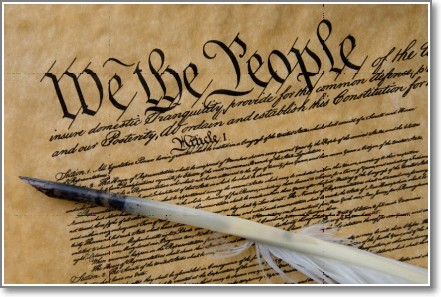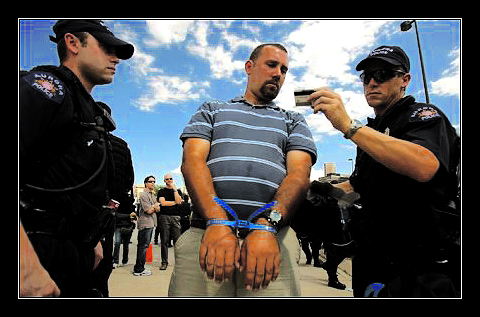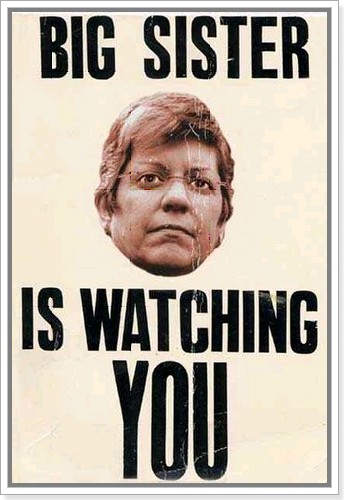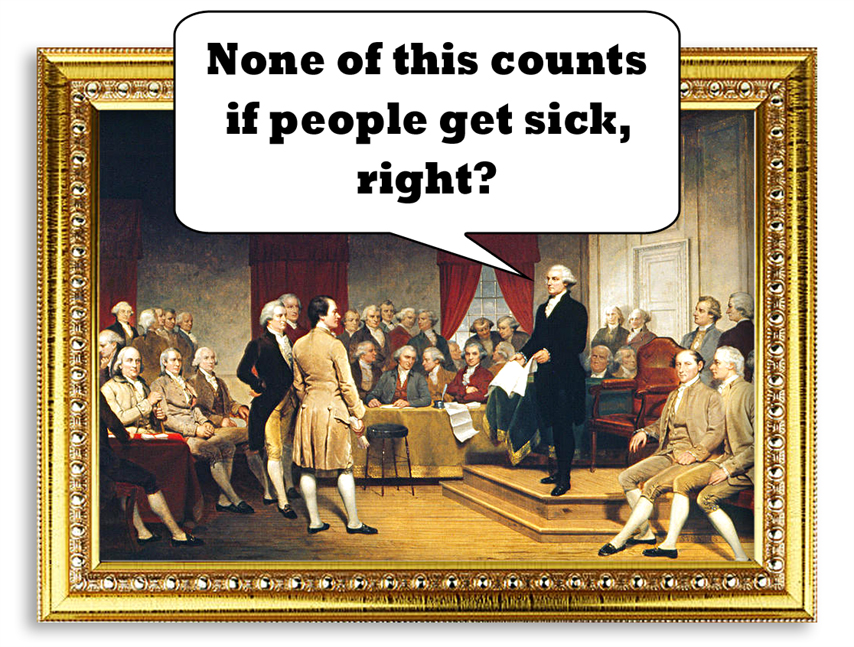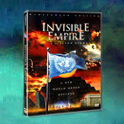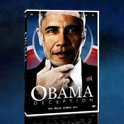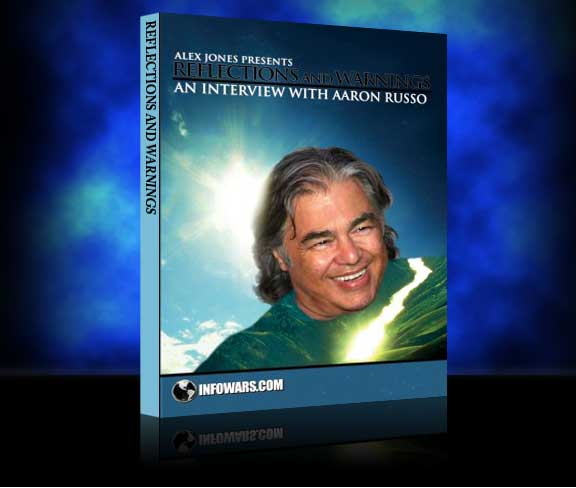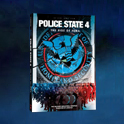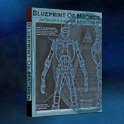welcome
|
||||||||
YOUR RIGHTS
"They are endowed by their Creator
with certain unalienable Rights"; "Certain rights can never be granted to the government but must be kept in the
hands of the people"; "a right is not something that
| ||||||||
|
Nullify Everything! Tenth Amendment Center | 3/25/18 A $1.3 trillion budget and $21 trillion in debt. _____________________________________________________ |
Quarantine: States, Feds and the Constitutions Tenth Amendment Center | 3/18/20 A national emergency declaration, and many others on the state and local level too. Looking at the leading constitutionalist views of what can and can't be done. https://tenthamendmentcenter.com ____________________________________________________ |
|
"I believe there are
more instances of the abridgement of the freedom of the people by gradual and silent encroachments
of those in power than by violent and sudden usurpation."
"The essence of
government is power; and power, lodged as it must be in human hands,
"The people didn't
fight the British to be brought under despotic rule under the notion of
|
|
|
Links: |
|
Natural Rights:
Liberty Doesn't Need a Government Permission
Slip
Even though many people credit Thomas Jefferson for the natural rights principles in the Declaration of Independence, Jefferson himself pointed out that he didn’t invent those ideas. Instead, he wrote, he had adopted the "harmonizing sentiments of the day," views which were widely accepted and understood. From 1764 to 1776, Americans produced a rich series of pamphlets, resolutions and speeches which he based those principles on.
Path to Liberty: December 14, 2020
JOIN TAC: https://tenthamendmentcenter.com/members/
Show Archives: https://tenthamendmentcenter.com/pathtoliberty/
Subscribe and Review on Apple: https://podcasts.apple.com/us/podcast/path-to-liberty/id1440549211
[vid]
DHS ‘Constitution Free’ Zones Inside US Ignored By Media

In what should be front page news blasted out nationwide as a breaking news alert, the DHS has openly established extensive ‘Constitution free zones’ in which your Fourth Amendment does not exist.
It’s not ‘conspiracy’ and it’s not fraud, the DHS has literally created an imaginary ‘border’ within the United States that engulfs 100 miles from every single end of the nation. Within this fabricated ‘border’, the DHS can search your electronic belongings for no reason. We’re talking about no suspicion, no reasonable cause, nothing. No reason whatsoever is required under their own regulations. The DHS is now above the Constitution under their own rules, and even Wired magazine authors were amazed at the level of pure tyranny going on here.
[vid]
This ‘border’ even includes where the US land meets oceans in addition to legitimate borders with Mexico and Canada. As a result, you have over 197 million citizens suffocated in these 100 mile ‘border zones’ that include major cities like New York City, Houston, Los Angeles, and Philadelphia. Checkout the graphic below for a visual representation, with the orange area representing the Constitution free zone as designated by the DHS:
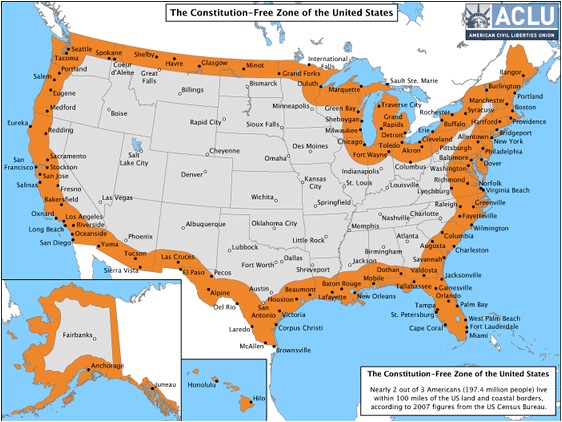
What’s even more amazing, is that this has been going on since 2008. That’s about 5 years of absolute unconstitutional abuse of power by the Department of Homeland Security that the media fails to even document. That’s 197 million citizens living without a Constitution as far as the DHS is concerned, and apparently the Department of Justice (DOJ) must be pretty content too. Amazingly, no one has challenged this besides the ACLU, which was contacted following the case of a man who was actually detained within the 100 mile ‘border’ area.
Not only was this man’s laptop searched for no reason, as is ‘allowed’ under DHS code now, but they ended up finding pictures designated to be linked up with ‘terrorist’ groups. In response, the man was thrown in a cell while DHS agents went through every piece of data on his entire laptop. The ACLU is now suing over this event, but there’s no telling how the case will go with such limited media exposure. The DHS is literally gutting the Constitution and declaring itself higher than the law of the land by doing this, and it spells out major trouble for the entire Bill of Rights at large.
DHS DISMISSES CONSTITUTION, BILL OF RIGHTS
Because if the DHS can simply ‘overrule’ the Fourth Amendment for 197 million citizens, it can also ‘overrule’ the First and Second Amendments as well. What’s stopping them? It’s highly illegal under the Constitution, but it appears they truly don’t care. And to demonstrate just how little they truly care, they have even gone and ‘reviewed’ themselves for their own actions following outcry from some legal experts.
To break it down: back in 2008 there was outrage from those who actually value the Constitution and understand how the bloated DHS entity works, so the DHS promised to prove within 120 days that what they were doing was constitutional and legal. Years later, the report came out to reveal that the DHS actually reviewed itself and determined that it was acting 100% properly. It also founds that everything it was doing was ‘constitutional’ because it was not actually removing the Constitution from United States soil, only the ‘border’.
The ‘border’ that expands 100 miles and includes 197 million people.
This news should be on the front page of every single news organization in the world, but the sad reality is that it’s not. It’s up to the alternative news, the real news, to report on this. It’s up to me to make videos about this, it’s up to the alternative news to syndicate it out, and it’s up to you to share this. It’s time to reclaim our Constitution and tell the DHS we won’t live in Constitution free zones any longer.
your rights, your rights,your rights,your rights,your rights,your rights,your rights,your rights,your rights,your rights,your rights,your rights,your rights,your rights,your rights,your rights,your rights,your rights,your rights,your rights,your rights,your rights,your rights,your rights,your rights,your rights,your rights,your ryour rights,your rights,your rights,your rights,your rights,your rights,your rights,your rights,your rights,your rights,our rights,your rights,your rights,your rights,your rights,your rights,your rights,your rights,your rights,your rights,your rights,your rights,your rights,your rights,your rights,your rights,your rights,your rights,your
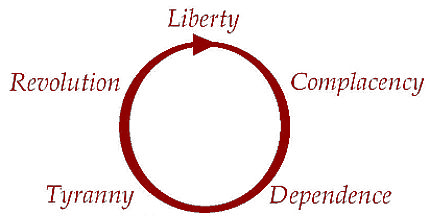
Fourth Turning
[vid]
Strauss & Howe's 1991 book "Generations" presented a cyclical theory of history, driven and timed to generations. It predicted the timing of the financial crisis that hit about 18 years later. In their 1997 book, "The Fourth Turning" they elaborated on the theory and focused on the crisis phase we have now entered — a phase of societal revolution that has usually brought war, in a trend they established back to the mid-1400's.
This report was originally uploaded in Jan 2013.
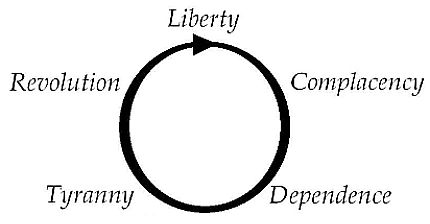
Scorecard: How Many Rights Have Americans REALLY Lost?
Washington’s Blog
Feb 22, 2013
Preface: While a lot of people talk about the loss of our Constitutional liberties, people usually speak in a vague, generalized manner … or focus on only one issue and ignore the rest.
This post explains the liberties guaranteed in the Bill of Rights – the first 10 amendments to the United States Constitution – and provides a scorecard on the extent of the loss of each right.
First Amendment
The 1st Amendment protects speech, religion, assembly and the press:
Congress shall make no law respecting an establishment of religion, or prohibiting the free exercise thereof; or abridging the freedom of speech, or of the press; or the right of the people peaceably to assemble, and to petition the Government for a redress of grievances.
However, the government is arresting those speaking out … and violently crushing peaceful assemblies which attempt to petition the government for redress.
A federal judge found that the law allowing indefinite detention of Americans without due process has a“chilling effect” on free speech. And see this and this.
The threat of being labeled a terrorist for exercising our First Amendment rights certainly violates the First Amendment. The government is using laws to crush dissent, and it’s gotten so bad that even U.S. Supreme Court justices are saying that we are descending into tyranny.
For example, the following actions may get an American citizen living on U.S. soil labeled as a “suspected terrorist” today:
- Being young (if you live near a battle zone, you are fair game; and see this)
- Protesting anything (such as participating in the “Occupy” movement)
- Questioning war (even though war reduces our national security; and see this)
- Criticizing the government’s targeting of innocent civilians with drones (although killing innocent civilians with drones is one of the main things which increases terrorism. And see this)
- Stocking up on more than 7 days of food (even though all Mormons are taught to stockpile food, and most Hawaiians store up on extra food)
- (Not having a Facebook account may soon be added)
And holding the following beliefs may also be considered grounds for suspected terrorism:
- Liking the Founding Fathers
- Being a Christian
- Being “anti-nuclear”
- Being “anti-abortion”
- Being “anti-Catholic”
- Being “anti-global”
Of course, Muslims are more or less subject to a separate system of justice in America.
And 1st Amendment rights are especially chilled when power has become so concentrated that the same agency which spies on all Americans also decides who should be assassinated.
Second Amendment
The 2nd Amendment states:
A well regulated Militia, being necessary to the security of a free State, the right of the people to keep and bear Arms, shall not be infringed.
Gun control and gun rights advocates obviously have very different views about whether guns are a force for violence or for good.
But even a top liberal Constitutional law expert reluctantly admits that the right to own a gun is as important a Constitutional right as freedom of speech or religion:
Like many academics, I was happy to blissfully ignore the Second Amendment. It did not fit neatly into my socially liberal agenda.
***
It is hard to read the Second Amendment and not honestly conclude that the Framers intended gun ownership to be an individual right. It is true that the amendment begins with a reference to militias: “A well regulated militia, being necessary to the security of a free state, the right of the people to keep and bear arms, shall not be infringed.” Accordingly, it is argued, this amendment protects the right of the militia to bear arms, not the individual.
Yet, if true, the Second Amendment would be effectively declared a defunct provision. The National Guard is not a true militia in the sense of the Second Amendment and, since the District and others believe governments can ban guns entirely, the Second Amendment would be read out of existence.
***
More important, the mere reference to a purpose of the Second Amendment does not alter the fact that an individual right is created. The right of the people to keep and bear arms is stated in the same way as the right to free speech or free press. The statement of a purpose was intended to reaffirm the power of the states and the people against the central government. At the time, many feared the federal government and its national army. Gun ownership was viewed as a deterrent against abuse by the government, which would be less likely to mess with a well-armed populace.
Considering the Framers and their own traditions of hunting and self-defense, it is clear that they would have viewed such ownership as an individual right — consistent with the plain meaning of the amendment.
None of this is easy for someone raised to believe that the Second Amendment was the dividing line between the enlightenment and the dark ages of American culture. Yet, it is time to honestly reconsider this amendment and admit that … here’s the really hard part … the NRA may have been right. This does not mean that Charlton Heston is the new Rosa Parks or that no restrictions can be placed on gun ownership. But it does appear that gun ownership was made a protected right by the Framers and, while we might not celebrate it, it is time that we recognize it.
The gun control debate – including which weapons and magazines are banned – is still in flux …
Third Amendment
The 3rd Amendment prohibits the government forcing people to house soldiers:
No Soldier shall, in time of peace be quartered in any house, without the consent of the Owner, nor in time of war, but in a manner to be prescribed by law.
Hey … we’re still honoring one of the Amendments! Score one for We the People!
Fourth Amendment
The 4th Amendment prevents unlawful search and seizure:
The right of the people to be secure in their persons, houses, papers, and effects, against unreasonable searches and seizures, shall not be violated, and no Warrants shall issue, but upon probable cause, supported by Oath or affirmation, and particularly describing the place to be searched, and the persons or things to be seized.
But the government is flying drones over the American homeland to spy on us.
Senator Rand Paul correctly notes:
The domestic use of drones to spy on Americans clearly violates the Fourth Amendment and limits our rights to personal privacy.
Paul introduced a bill to “protect individual privacy against unwarranted governmental intrusion through the use of unmanned aerial vehicles commonly called drones.”
Emptywheel notes in a post entitled “The OTHER Assault on the Fourth Amendment in the NDAA? Drones at Your Airport?”
***
As the map above makes clear–taken from this 2010 report–DOD [the Department of Defense] plans to have drones all over the country by 2015.
Many police departments are also using drones to spy on us. As the Hill reported:
At least 13 state and local police agencies around the country have used drones in the field or in training, according to the Association for Unmanned Vehicle Systems International, an industry trade group. The Federal Aviation Administration has predicted that by the end of the decade, 30,000 commercial and government drones could be flying over U.S. skies.
***
“Drones should only be used if subject to a powerful framework that regulates their use in order to avoid abuse and invasions of privacy,” Chris Calabrese, a legislative counsel for the American Civil Liberties Union, said during a congressional forum in Texas last month.
He argued police should only fly drones over private property if they have a warrant, information collected with drones should be promptly destroyed when it’s no longer needed and domestic drones should not carry any weapons.
He argued that drones pose a more serious threat to privacy than helicopters because they are cheaper to use and can hover in the sky for longer periods of time.
A congressional report earlier this year predicted that drones could soon be equipped with technologies to identify faces or track people based on their height, age, gender and skin color.
Even without drones, Americans are the most spied on people in world history:
The American government is collecting and storing virtually every phone call, purchases, email, text message, internet searches, social media communications, health information, employment history, travel and student records, and virtually all other information of every American. [And see this.]
Some also claim that the government is also using facial recognition software and surveillance cameras to track where everyone is going. Moreover, cell towers track where your phone is at any moment, and the major cell carriers, including Verizon and AT&T, responded to at least 1.3 million law enforcement requests for cell phone locations and other data in 2011. (And – given that your smartphone routinely sends your location information back to Apple or Google – it would be child’s play for the government to track your location that way.) Your iPhone, or other brand of smartphone is spying onvirtually everything you do (ProPublica notes: “That’s No Phone. That’s My Tracker“).
As the top spy chief at the U.S. National Security Agency explained this week, the American government is collecting some 100 billion 1,000-character emails per day, and 20 trillion communications of all types per year.
He says that the government has collected all of the communications of congressional leaders, generals and everyone else in the U.S. for the last 10 years.
He further explains that he set up the NSA’s system so that all of the information would automatically be encrypted, so that the government had to obtain a search warrant based upon probably cause before a particular suspect’s communications could be decrypted. [He specifically did this to comply with the Fourth Amendment's prohibition against unreasonable search and seizure.] But the NSA now collects all data in an unencrypted form, so that no probable cause is needed to view any citizen’s information. He says that it is actually cheaper and easier to store the data in an encrypted format: so the government’s current system is being done for political – not practical – purposes.
He says that if anyone gets on the government’s “enemies list”, then the stored information will be used to target them. Specifically, he notes that if the government decides it doesn’t like someone, it analyzes all of the data it has collected on that person and his or her associates over the last 10 years to build a case against him.
NSA
Whistleblower:
Everyone is Under Virtual Surveillance,
All Info Stored, No Matter The Post
LINK: NSA CAUGHT SPYING ON EVERYONE!
Wired reports:
Transit authorities in cities across the country are quietly installing microphone-enabled surveillance systems on public buses that would give them the ability to record and store private conversations….
The systems are being installed in San Francisco, Baltimore, and other cities with funding from the Department of Homeland Security in some cases ….
The IP audio-video systems can be accessed remotely via a built-in web server (.pdf), and can be combined with GPS data to track the movement of buses and passengers throughout the city.
***
The systems use cables or WiFi to pair audio conversations with camera images in order to produce synchronous recordings. Audio and video can be monitored in real-time, but are also stored onboard in blackbox-like devices, generally for 30 days, for later retrieval. Four to six cameras with mics are generally installed throughout a bus, including one near the driver and one on the exterior of the bus.
***
Privacy and security expert Ashkan Soltani told the Daily that the audio could easily be coupled with facial recognition systems or audio recognition technology to identify passengers caught on the recordings.
RT notes:
Street lights that can spy installed in some American cities
America welcomes a new brand of smart street lightning systems: energy-efficient, long-lasting, complete with LED screens to show ads. They can also spy on citizens in a way George Orwell would not have imagined in his worst nightmare.
With a price tag of $3,000+ apiece, according to an ABC report, the street lights are now being rolled out in Detroit, Chicago and Pittsburgh, and may soon mushroom all across the country.
Part of the Intellistreets systems made by the company Illuminating Concepts, they havea number of “homeland security applications” attached.
Each has a microprocessor “essentially similar to an iPhone,” capable ofwireless communication. Each can capture images and count people for the police through a digital camera, record conversations of passers-by and even give voice commands thanks to a built-in speaker.
Ron Harwood, president and founder of Illuminating Concepts, says he eyed the creation of such a system after the 9/11 terrorist attacks and the Hurricane Katrina disaster. He is“working with Homeland Security” to deliver his dream of making people “more informed and safer.”
Fox news notes that the government is insisting that “black boxes” be installed in cars to track your location.
The TSA has moved way past airports, trains and sports stadiums, and is deploying mobile scanners to spy on people all over the place. This means that traveling within the United States is no longer a private affair. (And they’re probably bluffing, but the Department of Homeland Security claims they will soon be able to know your adrenaline level, what you ate for breakfast and what you’re thinking … from 164 feet away.)
And Verizon has applied for a patent that would allow your television to track what you are doing, who you are with, what objects you’re holding, and what type of mood you’re in. Given Verizon and other major carriers responded to at least 1.3 million law enforcement requests for cell phone locations and other data in 2011, such information would not be kept private. (And some folks could be spying on you through your tv using existing technology.)
Of course, widespread spying on Americans began before 9/11 (confirmed here and here. And see this). So the whole “post-9/11 reality” argument falls flat.
And the spying isn’t being done to keep us safe … but to crush dissent and to smear people who uncover unflattering this about the government … and to help the too big to fail businesses compete against smaller businesses (and here).
In addition, the ACLU published a map in 2006 showing that nearly two-thirds of the American public – 197.4 million people – live within a “constitution-free zone” within 100 miles of land and coastal borders.
The ACLU explained:
- Normally under the Fourth Amendment of the U.S. Constitution, the American people are not generally subject to random and arbitrary stops and searches.
- The border, however, has always been an exception. There, the longstanding view is that the normal rules do not apply. For example the authorities do not need a warrant or probable cause to conduct a “routine search.”
- But what is “the border”? According to the government, it is a 100-mile wide strip that wraps around the “external boundary” of the United States.
- As a result of this claimed authority, individuals who are far away from the border, American citizens traveling from one place in America to another, are being stopped and harassed in ways that our Constitution does not permit.
- Border Patrol has been setting up checkpoints inland — on highways in states such as California, Texas and Arizona, and at ferry terminals in Washington State. Typically, the agents ask drivers and passengers about their citizenship. Unfortunately, our courts so far have permitted these kinds of checkpoints – legally speaking, they are “administrative” stops that are permitted only for the specific purpose of protecting the nation’s borders. They cannot become general drug-search or other law enforcement efforts.
- However, these stops by Border Patrol agents are not remaining confined to that border security purpose. On the roads of California and elsewhere in the nation – places far removed from the actual border – agents are stopping, interrogating, and searching Americans on an everyday basis with absolutely no suspicion of wrongdoing.
- The bottom line is that the extraordinary authorities that the government possesses at the border are spilling into regular American streets.
Computer World reports today:
Border agents don’t need probable cause and they don’t need a stinking warrant since they don’t need to prove any reasonable suspicion first. Nor, sadly, do two out of three people have First Amendment protection; it is as if DHS has voided those Constitutional amendments and protections they provide to nearly 200 million Americans.
***
Don’t be silly by thinking this means only if you are physically trying to cross the international border. As we saw when discussing the DEA using license plate readers and data-mining to track Americans movements, the U.S. “border” stretches out 100 miles beyond the true border. Godfather Politics added:
But wait, it gets even better! If you live anywhere in Connecticut, Delaware, Florida, Hawaii, Maine, Massachusetts, Michigan, New Hampshire, New Jersey or Rhode Island, DHS says the search zones encompass the entire state.
Immigrations and Customs Enforcement (ICE) and Customs and Border Protection (CBP) have a “longstanding constitutional and statutory authority permitting suspicionless and warrantless searches of merchandise at the border and its functional equivalent.” This applies to electronic devices, according to the recent CLCR “Border Searches of Electronic Devices” executive summary [PDF]:
Fourth Amendment
The overall authority to conduct border searches without suspicion or warrant is clear and longstanding, and courts have not treated searches of electronic devices any differently than searches of other objects. We conclude that CBP’s and ICE’s current border search policies comply with the Fourth Amendment. We also conclude that imposing a requirement that officers have reasonable suspicion in order to conduct a border search of an electronic device would be operationally harmful without concomitant civil rights/civil liberties benefits. However, we do think that recording more information about why searches are performed would help managers and leadership supervise the use of border search authority, and this is what we recommended; CBP has agreed and has implemented this change beginning in FY2012.
First Amendment
Some critics argue that a heightened level of suspicion should be required before officers search laptop computers in order to avoid chilling First Amendment rights. However, we conclude that the laptop border searches allowed under the ICE and CBP Directives do not violate travelers’ First Amendment rights.
The ACLU said, Wait one darn minute! Hello, what happened to the Constitution? Where is the rest of CLCR report on the “policy of combing through and sometimes confiscating travelers’ laptops, cell phones, and other electronic devices—even when there is no suspicion of wrongdoing?” DHS maintains it is not violating our constitutional rights, so the ACLU said:
If it’s true that our rights are safe and that DHS is doing all the things it needs to do to safeguard them, then why won’t it show us the results of its assessment? And why would it be legitimate to keep a report about the impact of a policy on the public’s rights hidden from the very public being affected?
***
As ChristianPost wrote, “Your constitutional rights have been repealed in ten states. No, this isn’t a joke. It is not exaggeration or hyperbole. If you are in ten states in the United States, your some of your rights guaranteed by the Bill of Rights have been made null and void.”
The ACLU filed a Freedom of Information Act request for the entire DHS report about suspicionless and warrantless “border” searches of electronic devices. ACLU attorney Catherine Crump said “We hope to establish that the Department of Homeland Security can’t simply assert that its practices are legitimate without showing us the evidence, and to make it clear that the government’s own analyses of how our fundamental rights apply to new technologies should be openly accessible to the public for review and debate.”
Meanwhile, the EFF has tips to protect yourself and your devices against border searches. If you think you know all about it, then you might try testing your knowledge with a defending privacy at the U.S. border quiz.
Wired pointed out in 2008 that the courts have routinely upheld such constitution-free zones:
Federal agents at the border do not need any reason to search through travelers’ laptops, cell phones or digital cameras for evidence of crimes, a federal appeals court ruled Monday, extending the government’s power to look through belongings like suitcases at the border to electronics.
***
The 9th U.S. Circuit Court of Appeals sided with the government, finding that the so-called border exception to the Fourth Amendment’s prohibition on unreasonable searches applied not just to suitcases and papers, but also to electronics.
***
Travelers should be aware that anything on their mobile devices can be searched by government agents, who may also seize the devices and keep them for weeks or months. When in doubt, think about whether online storage or encryption might be tools you should use to prevent the feds from rummaging through your journal, your company’s confidential business plans or naked pictures of you and your-of-age partner in adult fun.
Fifth Amendment
The 5th Amendment addresses due process of law, eminent domain, double jeopardy and grand jury:
No person shall be held to answer for a capital, or otherwise infamous crime, unless on a presentment or indictment of a Grand Jury, except in cases arising in the land or naval forces, or in the Militia, when in actual service in time of War or public danger; nor shall any person be subject for the same offense to be twice put in jeopardy of life or limb; nor shall be compelled in any criminal case to be a witness against himself, nor be deprived of life, liberty, or property, without due process of law; nor shall private property be taken for public use, without just compensation.
But the American government has shredded the 5th Amendment by subjecting us to indefinite detentionand taking away our due process rights.
The government claims the right to assassinate or indefinitely detain any American citizen on U.S. citizen without any due process. And see this.
As such, the government is certainly depriving people of life, liberty, or property, without due process of law.
There are additional corruptions of 5th Amendment rights – such as property being taken for privatepurposes.
The percentage of prosecutions in which a defendant is denied a grand jury is difficult to gauge, as there is so much secrecy surrounding many terrorism trials.
Protection against being tried twice for the same crime after being found innocent (“double jeopardy”) seems to be intact.
Sixth Amendment
The 6th Amendment guarantees the right to hear the criminal charges levied against us and to be able to confront the witnesses who have testified against us, as well as speedy criminal trials, and a public defender for those who cannot hire an attorney:
In all criminal prosecutions, the accused shall enjoy the right to a speedy and public trial, by an impartial jury of the State and district wherein the crime shall have been committed, which district shall have been previously ascertained by law, and to be informed of the nature and cause of the accusation; to be confronted with the witnesses against him; to have compulsory process for obtaining witnesses in his favor, and to have the Assistance of Counsel for his defence.
Subjecting people to indefinite detention or assassination obviously violates the 6th Amendment right to a jury trial. In both cases, the defendants is “disposed of” without ever receiving a trial … and often without ever hearing the charges against them.
More and more commonly, the government prosecutes cases based upon “secret evidence” that they don’t show to the defendant … or sometimes even the judge hearing the case.
The government uses “secret evidence” to spy on Americans, prosecute leaking or terrorism charges (even against U.S. soldiers) and even assassinate people. And see this and this.
Secret witnesses are being used in some cases. And sometimes lawyers are not even allowed to read their own briefs.
Indeed, even the laws themselves are now starting to be kept secret. And it’s about to get a lot worse.
True – when defendants are afforded a jury trial – they are provided with assistance of counsel. However, the austerity caused by redistribution of wealth to the super-elite is causing severe budget cuts to the courts and the public defenders’ offices nationwide.
Moreover, there are two systems of justice in America … one for the big banks and other fatcats, and one for everyone else. The government made it official policy not to prosecute fraud, even though fraud is the main business model adopted by Wall Street. Indeed, the biggest financial crime in world history, thelargest insider trading scandal of all time, illegal raiding of customer accounts and blatant financing of drug cartels and terrorists have all been committed recently without any real criminal prosecution or jail time.
On the other hand, government prosecutors are using the legal system to crush dissent and to silence whistleblowers.
And some of the nation’s most powerful judges have lost their independence … and are in bed with the powers-that-be.
Seventh Amendment
The 7th Amendment guarantees trial by jury in federal court for civil cases:
In Suits at common law, where the value in controversy shall exceed twenty dollars, the right of trial by jury shall be preserved, and no fact tried by a jury, shall be otherwise re-examined in any Court of the United States, than according to the rules of the common law.
As far as we know, this right is still being respected. However – as noted above – the austerity caused by redistribution of wealth to the super-elite is causing severe budget cuts to the courts, resulting in the wheels of justice slowing down considerably.
Eighth Amendment
The 8th Amendment prohibits cruel and unusual punishment:
Excessive bail shall not be required, nor excessive fines imposed, nor cruel and unusual punishments inflicted.
Indefinite detention and assassination are obviously cruel and unusual punishment.
The widespread system of torture carried out in the last 10 years – with the help of other countries –violates the 8th Amendment. Many want to bring it back … or at least justify its past use.
While Justice Scalia disingenuously argues that torture does not constitute cruel and unusual punishment because it is meant to produce information – not punish – he’s wrong. It’s not only cruel and unusual … it is technically a form of terrorism.
And government whistleblowers are being cruelly and unusually punished with unduly harsh sentences meant to intimidate anyone else from speaking out.
Ninth Amendment
The 9th Amendment provides that people have other rights, even if they aren’t specifically listed in the Constitution:
The enumeration in the Constitution, of certain rights, shall not be construed to deny or disparage others retained by the people.
We can debate what our inherent rights as human beings are. I believe they include the right to a level playing field, and access to safe food and water. You may disagree.
But everyone agrees that the government should not actively encourage fraud and manipulation. However, the government – through its malignant, symbiotic relation with big corporations – is interfering with our aspirations for economic freedom, safe food and water (instead of arsenic-laden, genetically engineered junk), freedom from undue health hazards such as irradiation due to government support of archaic nuclear power designs, and a level playing field (as opposed to our crony capitalist system in which the little guy has no shot due to redistribution of wealth from the middle class to the super-elite, and government support of white collar criminals).
By working hand-in-glove with giant corporations to defraud us into paying for a lower quality of life, the government is trampling our basic rights as human beings.
Tenth Amendment
The 10th Amendment provides that powers not specifically given to the Federal government are reserved to the states or individual:
The powers not delegated to the United States by the Constitution, nor prohibited by it to the States, are reserved to the States respectively, or to the people.
Two of the central principles of America’s Founding Fathers are:
(1) The government is created and empowered with the consent of the people
and
(2) Separation of powers
Today, most Americans believe that the government is threatening – rather than protecting – freedom … and that it is no longer acting with the “consent of the governed”.
And the federal government is trampling the separation of powers by stepping on the toes of the states and the people. For example, former head S&L prosecutor Bill Black – now a professor of law and economics – notes:
The Federal Reserve Bank of New York and the resident examiners and regional staff of the Office of the Comptroller of the Currency [both] competed to weaken federal regulation and aggressively used the preemption doctrine to try to prevent state investigations of and actions against fraudulent mortgage lenders.
Indeed, the federal government is doing everything it can to stick its nose into every aspect of our lives … and act like Big Brother.
Conclusion: While a few of the liberties enshrined in the Bill of Rights still exist, the overall scorecard of the government’s respect for our freedom: a failing grade.
This article was posted: Friday, February 22, 2013 at 5:50 am
Related Articles
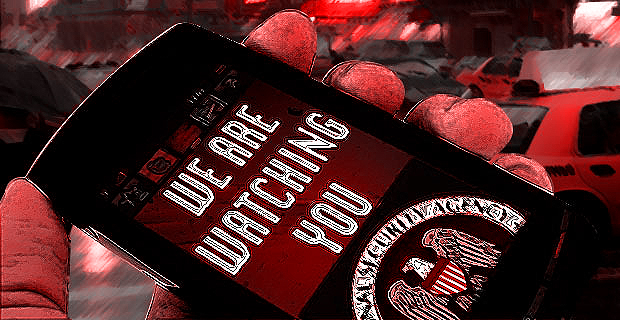
Still Report #288 - NSA's Bill Binney - Part 1
Published on Jun 28, 2014
New revelations on the scope of NSA spying on Americans - Part 1
Please consider supporting us there for as little as $1 per month. Go to billstill.com, click on the Subscribe
button. You can Unsubscribe at any time. Or send single donations via PayPal to: [email protected]
LINK: NSA CAUGHT SPYING ON EVERYONE!
SR 290 - NSA's Bill Binney - Part 2
Bill Binney confirms that all content of all phone calls within the United States are recorded and one
million a day are transcribed for permanent preservation. Please consider supporting us there for as little as $1
per month. Go to billstill.com, click on the Subscribe button. You can Unsubscribe at any time. Or send single
donations via PayPal to: [email protected]
LINK: NSA CAUGHT SPYING ON EVERYONE!
Still Report #291 - NSA's Bill Binney - Part 3
Spying even on Supreme Court Justices!
LINK: NSA CAUGHT SPYING ON EVERYONE!
Still Report #293 - NSA's Bill Binney - Part 4
Mr. Binney talks about the line between rightly classified material and that which is classified to cover up
evidence of a crime and much more.
LINK: NSA CAUGHT SPYING ON EVERYONE!
Still Report #294 - NSA's Bill Binney - Part 5
Mr. Binney explains how NSA intel is disseminated to police domestically. He also answers the question: is there anything we can do to protect ourselves cryptographically? He explains that NSA has a "turn-key" totalitarian state set up, but they have not implemented its full potential. He also explains what we can do about it.
LINK: NSA CAUGHT SPYING ON EVERYONE!
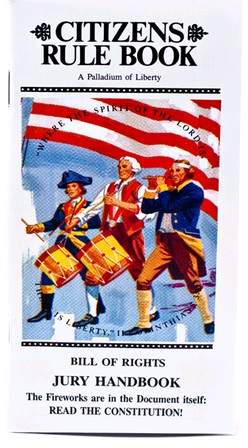
DOWNLOAD THE CITIZEN'S RULE BOOK PDF HERE:
http://www.apfn.org/pdf/citizen.pdf
The Citizen’s Rule Book
CITIZENS RULE BOOK
“Where the spirit of the Lord is, there is Liberty.” Corinthians 3:17
Rights Come From God!
JURY HANDBOOK
A Palladium of Liberty
LINCOLN said “Study the Constitution!”
“Let it be preached from the pulpit, proclaimed in legislatures, and enforced in courts of justice.”
Quality reprints may be obtained from:
Christian Patriots
P.O. Box 521
Placentia, CA 92670
(714) 449-9504
Whitten Printers -- (602) 258-6406, 1001 S. 5th St, Phoenix, AZ 85004
Editorial Work By Webster Adams
PAPERHOUSE PUBLICATIONS
“Stronger than Steel!” 4th Revision
RIGHTS COME FROM GOD, NOT THE STATE!
“You have rights antecedent to all earthly governments; rights that cannot be repealed or restrained by human laws;
rights derived from the Great Legislator of the Universe.” John Adams, Second President of the United States
TABLE OF CONTENTS
SEC. I A HANDBOOK FOR JURORS
Jury Duty. . . . . . . . . . . . . . 2
You are above the Law! . . . . . . . 4
Jury Rights . . . . . . . . . . . . . 6
Law of the Land . . . . . . . . . . . 7
Ten Commandments . . . . . . . . 8
Communist Manifesto . . . . . . . . 8
Give Up Rights? . . . . . . . . . . . 9
Jury Tampering? . . . . . . . . . . 11
SEC. II GIVE ME LIBERTY ...
Patrick Henry Shocked . . . . . . . . 15
Jury of Peers . . . . . . . . . . . . 16
Freedom for William Penn . . . . . . 18
Jefferson’s Warnings! . . . . . . . . 20
SEC. III ORIGINAL DOCUMENTS
Index to the documents . . . . . . . . . . 21
The Declaration of Independence . . . . . . 26
(Original Title—Page 26)
The Constitution . . . . . . . . . . . 32
The Bill of Rights . . . . . . . . . . . 49
SEC. 1 A HANDBOOK FOR JURORS
“...That this nation, under God, shall have a new birth of Freedom...” Abraham Lincoln
JURY DUTY!
The purpose of this booklet is to revive, as Jefferson put it, “The Ancient Principles.” It is not
designed to promote lawlessness or a return to the jungle. The “Ancient Principles” refer to the
Ten Commandments and the Common Law. The Common Law is, in simple terms, just plain
common sense and has its roots in the Ten Commandments.
In 1776 we came out of BONDAGE with FAITH, UNDERSTANDING and COURAGE. Even
against great odds, and with much bloodshed, we battled our way to achieve LIBERTY.
LIBERTY is that delicate balance between the force of government and FREEWILL of man.
LIBERTY brings FREEDOM of choice to work, to trade, to go and live where one wishes; it
leads to ABUNDANCE. ABUNDANCE, if made an end to itself, will result in
COMPLACENCY, which leads to APATHY. APATHY is the “let George do it” philosophy.
This always brings DEPENDENCY. For a period of time, dependents are often not aware they
are dependent. They delude themselves by thinking that they are still free—
“We never had it so good.”—“We can still vote, can’t we?” Eventually abundance diminishes
and DEPENDENCY becomes known by its true nature:
BONDAGE!
There are few ways out of bondage. Bloodshed and war often result, but our founding fathers
learned of a better way. Realizing that a CREATOR is always above and greater than that
which He creates, they established a three vote system by which an informed citizenry can
control those acting in the name of the government. To be a good master you must always
remember the true “pecking order” or chain of command in this nation:
1. GOD created man . . .
2. Man (that’s you) created the Constitution . . .
3. Constitution created government . . .
4. Government created corporations . .etc.
The base of power was to remain in WE THE PEOPLE but unfortunately, it was lost to those
leaders acting in the name of the government, such as politicians, bureaucrats, judges, lawyers,
etc.
As a result America began to function like a democracy instead of a REPUBLIC. A democracy
is dangerous because it is a one-vote system as opposed to a Republic, which is a three-vote
system: Three votes to check tyranny, not just one. American citizens have not been informed
of their other two votes.
Our first vote is at the polls on election-day when we pick those who are to represent us in the
seats of government. But what can be done if those elected officials just don’t perform as
promised or expected? Well, the second two votes are the most effective means by which the
common people of any nation on earth have even had in controlling those appointed to serve
them in government.
The second vote comes when you serve on a Grand Jury. Before anyone can be brought to trial
for a capital or infamous crime by those acting in the name of the government, permission must
be obtained from people serving on the Grand Jury! The Minneapolis Star and Tribune in
March 27, 1987, edition noted a purpose of the grand Jury in this way:
“A Grand Jury’s purpose is to protect the public from an overzealous prosecutor.”
The third is the most powerful vote: this is when you are acting as a jury member during a
courtroom trial. At this point, “the buck stops” with you! It is in this setting that each JUROR
has MORE POWER than the President, all of Congress, and all of the judges combined!
Congress can legislate (make law), the President or some other bureaucrat can make an order or
issue regulations, and judges may instruct or make a decision, but no JUROR can ever be
punished for voting “Not Guilty!” Any juror can, with impunity, choose to disregard the
instructions of any judge or attorney in rendering his vote. If only one JUROR should vote
“Not Guilty” for any reason, there is no conviction and no punishment at the end of the trial.
Thus, those acting in the name of government must come before the common man to get
permission to enforce law.
YOU ARE ABOVE THE LAW!
As a JUROR in a trial setting, when it comes to your individual vote of innocent or guilty, you
are truly answerable to GOD ALMIGHTY. The First Amendment to the Constitution was born
out of this great concept. However, judges of today refuse to inform JURORS of their
RIGHTS. THe Minneapolis Star and Tribune in a news paper article appearing in its November
30, 1984 edition, entitled: “What Judges Don’t Tell Juries” stated:
“At the time of adoption of the Constitution, the jury’s role as a defense against political
oppression was unquestioned in American jurisprudence. This nation survived until the
1850’s, when prosecutions under the Fugitive Slave Act were largely unsuccessful because
juries refused to convict.”
“Then judges began to erode the institution of free juries, leading to the absurd compromise that
is the current state of the law. While our courts uniformly state juries have the power to return
a verdict of not guilty whatever the facts, they routinely tell jurors the opposite.”
“Further, the courts will not allow the defendants or their counsel to inform the jurors of their
true power. A lawyer who made . . . Hamilton’s argument would face professional discipline
and charges of contempt of court.”
“By what logic should juries have the power to acquit a defendant but no right to know about
that power? The court decisions that have suppressed the notion of jury nullification cannot
resolve this paradox.”
“More than logic has suffered. As originally conceived, juries were to be made a safety valve
way to soften the bureaucratic rigidity of the judicial system by introducing the common sense
of the community. If they are to function effectively as the ‘conscience of the community,’
jurors must be told that they have the power and the right to say no to a prosecution in order to
achieve a greater good. To cut jurors off from this information is to undermine one of our most
important institutions.”
“Perhaps the community should educate itself. Then citizens called for jury duty could teach
the judges a needed lesson in civics.”
This booklet is designed to bring to your attention one important way our nation’s founders
provided to insure that you, (not the growing army of politicians, judges, lawyers, and
bureaucrats) rule this nation. it will focus on the rule of power you possess as a JUROR, how
you got it, why you have it, and remind you of the basis on which you must decide not only the
facts placed in evidence but also the validity or applicability of every law, rule, regulation,
ordinance, or instruction given by any man seated as a judge or attorney when you serve as a
JUROR.
One JUROR can stop tyranny with a “NOT GUILTILY VOTE!” He can nullify bad law in any
case, by “HANGING THE JURY!”
“I am only one, but I am one. I cannot do everything, but I can do something. What I can do, I
should do and, with the help of God, I will do!” Everett Hale
The only power the judge has over the JURY is their ignorance!
JURY RIGHTS
“The jury has the right to judge both the law as well as the fact in controversy.” John Jay, 1st
Chief Justice U.S. supreme Court, 1789
“The jury has the right to determine both the law and the facts.” Samuel Chase, U.S. supreme
Court Justice, 1796, Signer of the unanimous Declaration
“The jury has the power to bring a verdict in the teeth of both law and fact.” Oliver Wendell
Holmes, U.S. supreme Court Justice, 1902
“The law itself is on trial quite as much as the cause which is to be decided.” Harlan F. Stone,
12th Chief Justice U.S. supreme Court, 1941
“The pages of history shine on instances of the jury’s exercise of its prerogative to disregard
instructions of the judge...” U.S. vs. Dougherty, 473 F 2nd 1113, 1139. (1972)
LAW OF THE LAND
The general misconception is that any statute passed by legislators bearing the appearance of
law constitutes the law of the land. The U.S. Constitution is the supreme law of the land, and
any statute, to be valid, must be in agreement. It is impossible for a law, which violates the
Constitution to be valid. This is succinctly stated as follows:
“All laws which are repugnant to the Constitution are null and void.” Marbury vs. Madison, 5
US (2 Cranch) 137, 174, 176, (1803)
“When rights secured by the Constitution are involved, there can be no rule making or
legislation which would abrogate them.” Miranda vs. Arizona, 384 US 436 p. 491.
“An unconstitutional act is not law; it confers no rights; it imposes no duties; affords no
protection; it creates no office; it is in legal contemplation, as inoperative as though it had never
been passed.” Norton vs. Shelby County 118 US 425 p. 442
“The general rule is that an unconstitutional statute, though having the form and name of law, is
in reality no law, but is wholly void, and ineffective for any purpose; since unconstitutionality
dates from the time of its enactment, and not merely from the date of the decision so branding
it.
“No one is bound to obey an unconstitutional law and no courts are bound to enforce it.” 16
Am Jur 2nd, Sec 177 late 2d, Sec 256
A SUMMARY OF THE TEN COMMANDMENTS
The TEN COMMANDMENTS represent GOD’S GOVERNMENT OVER MAN! GOD
commands us for our own good to give up wrongs and not rights! HIS system always results in
LIBERTY and FREEDOM! The Constitution and the Bill of Rights are built on this foundation,
which provides for punitive justice. It is not until one damages another persons property that he
can be punished. The Marxist system leads to bondage and GOD’S system leads to LIBERTY!
Read very carefully:
1. Thou shalt have no other gods before Me.
2. Thou shalt not make unto thee any graven image.
3. Thou shalt not take the name of the Lord thy God in vain.
4. Remember the Sabbath to keep it Holy.
5. Honor thy father and thy mother.
6. Thou shalt not murder.
7. Thou shalt not commit adultery.
8. Thou shalt not steal.
9. Thou shalt not bear false witness.
10. Thou shalt not covet.
Directly above the Chief Justice’s chair is a tablet signifying the TEN COMMANDMENTS.
When the Speaker of the House in the U.S. Congress looks up, his eyes look into the face of
Moses.
“The Bible is the Book upon which this Republic rests.” Andrew Jackson, Seventh President of
the United States
“The moral principles and precepts contained in the Scriptures ought to form the basis of all our
civil constitutions and laws. All the miseries and evils which men suffer from vice, crime,
ambition, injustice, oppression, slavery, and war, proceed from their despising or neglecting the
precepts of the Bible.” Noah Webster
A SUMMARY OF THE COMMUNIST MANIFESTO
The Communist Manifesto represents a misguided philosophy, which teaches the citizens to
give up their RIGHTS for the sake of the “common good,” but it always ends in a police state.
This is called preventive justice.
Control is the key concept. Read carefully:
1. Abolition of private property.
2. Heavy progressive income tax.
3. Abolition of all rights on inheritance.
4. Confiscation of property of all emigrants and rebels.
5. Central bank.
6. Government control of Communications & Transportation.
7. Government ownership of factories and agriculture.
8. Government control of labor.
9. Corporate farms, regional planning.
10. Government control of education.
GIVE UP RIGHTS FOR THE “COMMON GOOD”?
Where people fear the government you have tyranny; where the government fears the people,
you have liberty.
Politicians, bureaucrats and especially judges would have you believe that too much freedom
will result in chaos. Therefore, we should gladly give up some of our RIGHTS for the good of
the community. In other words, people acting in the name of the government, say we need
more laws and more JURORS to enforce these laws—even if we have to give up some
RIGHTS in the process. They believe the more laws we have, the more control, thus a better
society. THis theory may sound good on paper, and apparently many of our leaders think this
way, as evidenced by the thousands of new laws that are added to the books each year in this
country. But, no matter how cleverly this Marxist argument is made, the hard fact is that
whenever you give up a RIGHT you lose a “FREE CHOICE”!
This adds another control. Control’s real name is BONDAGE! The logical conclusion would be, if
giving up some RIGHTS produces a better society, then by giving up all RIGHTS we could
produce a perfect society. We could chain everybody to a tree, for lack of TRUST. This may
prevent crime, but it would destroy PRIVACY, which is the heartbeat of FREEDOM! It would
also destroy TRUST which is the foundation for DIGNITY. Rather than giving up RIGHTS, we
should be giving up wrongs! The opposite of control is not chaos. More laws do not make less
criminals! We must give up wrongs, not rights, for a better society! William Pitt of the British
House of Commons once proclaimed, “Necessity is the plea for every infringement of human
liberty; it is the argument of tyrants; it is the creed of slaves.”
INALIENABLE, [UNALIENABLE] OR NATURAL RIGHTS!
NATURAL RIGHTS ARE THOSE RIGHTS such as life (from conception), LIBERTY and the
PURSUIT OF HAPPINESS e.g. FREEDOM of RELIGION, SPEECH, LEARNING, TRAVEL,
SELF-DEFENSE, ETC. Hence laws and statutes, which violate NATURAL RIGHTS, though they
may have the color of law, are not law but impostors! The U.S. Constitution was written to protect
these NATURAL RIGHTS from being tampered with by legislators. * Further, our forefathers also
wisely knew that the U.S. Constitution would be utterly worthless to restrain government
legislators unless it was clearly understood that the people had the right to compel the government
to keep within the Constitutional limits.
*Lysander Spooner wrote as follows:
“Government is established for the protection of the weak against the strong. This is the principal,
if not the sole motive for the establishment of all legitimate government. It is only the weaker party
that loses their liberties, when a government becomes oppressive. The stronger party, in all
governments are free by virtue of their superior strength. They never oppress themselves.
Legislation is the work of the stronger party; and if, in addition to the sole power of legislation,
they have the sole power of determining what legislation shall be enforced, they have all power in
their hands, and the weaker party are the subjects of an absolute government. Unless the weaker
party have veto, they have no power whatever in the government . . . no liberties . . . The trial by
jury is the only institution that gives the weaker party any veto upon the power of the stronger.
Consequently it is the only institution that gives them any effective voice in the government, or any
guaranty against oppression.
ESSAY on the TRIAL by Jury
JURY TAMPERING?
A JURY’s Rights, Powers and Duties:
The Charge to the JURY in the First JURY Trial before the supreme* Court of the U.S.
Illustrates the TRUE POWER OF THE JURY. In the February term of 1794, the supreme
Court conducted a JURY trial and said “. . . it is presumed, that the juries are the best judges of
facts; it is, on the other hand, presumed that the courts are the best judges of law. But still both
objects are within our power of decision.”
“You have a right to take upon yourselves to judge of both, and to determine the law as well as
the fact in controversy.” -(State of Georgia vs. Brailsford, et al, 3 Dall. 1)
“The JURY has an unreviewable and unreversible power . . . to acquit in disregard of the
instructions on the law given by the trial judge . . .” (emphasis added) U.S. vs. Dougherty, 473
F 2nd 1113, 1139 (1972)
Hence, JURY disregard of the limited and generally conviction-oriented evidence presented for
its consideration, and JURY disregard for what the trial judge wants them to believe is the
controlling law in particular case (sometimes referred to as “JURY lawlessness”)* is not
something to be scrupulously avoided, but rather encouraged. Witness the following quotation
from the eminent legal authority above-mentioned: “Jury lawlessness is the greatest corrective
of law in its actual administration. The will of the state at large imposed on a reluctant
community, the will of a majority imposed on a vigorous and determined minority, find the
same obstacle in the local JURY that formerly confronted kings and ministers.” (emphasis
added) (Dougherty cited above, note 32 at 1130)
*Supreme is not capitalized in the Constitution, however Behavior is.
*Jury lawlessness means willingness to nullify bad law.
The Right of the JURY to be Told of Its Power
Almost every JURY in the land is falsely instructed by the judge when it is told it must accept
as the law that which is given to them by the court, and that the JURY can decide only the facts
of the case. This is to destroy the purpose of a Common Law JURY, and to permit the
imposition of tyranny upon a people.
“There is nothing more terrifying than ignorance in action.” Goethe (engraved on a plaque at
the Naval War College)
“To embarrass justice by a multiplicity of laws, or to hazard it by confidence in judges, are the
opposite rocks on which all civil instructions have been wrecked.” Johnson (engraved in
Minnesota State Capitol Outside the Supreme Court Chambers)
“. . . The letter killeth, but the spirit giveth life.” II Corinthians 3:6
“It is error alone which needs the support of government. truth can stand by itself.” Thomas
Jefferson
The JURY’S options are by no means limited to the choices presented to it in the courtroom.
“The jury gets its understanding as to the arrangements in the legal system from more than one
voice. There is the formal communication from the ‘judge.’ There is informal communication
from the total culture—literature; current comment, conversation; and, of course, history and
tradition.” (Dougherty cited above, at 1135)
LAWS, FACTS AND EVIDENCE!
Without the power to decide what facts, law and evidence are applicable, JURIES cannot be a
protection to the accused. If people acting in the name of government are permitted by
JURORS to dictate any law whatever, they can also unfairly dictate what evidence is admissible
or inadmissible and thereby prevent the WHOLE TRUTH from being considered. Thus if
government can manipulate and control both the law and the evidence, the issue of fact
becomes virtually irrelevant. In reality, true JUSTICE would be denied leaving us with a trial
by government and not a trial by JURY!
HOW DOES TYRANNY BEGIN?
WHY ARE THERE SO MANY LAWS?
Heroes are men of glory who are so honored because of some heroic deed. People often out of
gratitude yield allegiance to them. Honor and allegiance are nice words for power! Power and
allegiance can only be held rightfully by trust as a result of continued character.
When people acting in the name of government violate ethics, they break trust with “WE THE
PEOPLE.” The natural result is for “WE THE PEOPLE” to pull back power (honor and
allegiance).
The loss of power creates fear for those losing the power. Fearing loss of power, people acting
in the name of government often seek to regain or at least hold their power. Hence, to
legitimize their quest for control, laws and force are often instituted.
Unchecked power is the foundation of tyranny. It is the JUROR’S duty to use the JURY
ROOM as a vehicle to stem the tide of oppression and tyranny:
To prevent bloodshed by peacefully removing power from those who have abused it. The
JURY is the primary vehicle for peaceful restoration of LIBERTY, POWER AND HONOR TO
“WE THE PEOPLE!”
YOUR VOTE COUNTS!
Your vote of NOT Guilty must be respected by all members of the JURY— it is the RIGHT
and DUTY of a JUROR to Never, Never, Never yield his or her sacred vote—for you are not
there as a fool, merely to agree with the majority, but as an officer of the court and a qualified
judge in your own right. Regardless of the pressures or abuse that may be heaped on you by
any other members of the JURY with whom you may be in good conscience to disagree, you
can await the reading of the verdict secure in the knowledge you have voted your own
conscience and convictions—and not those of someone else.
YOU ARE NOT A RUBBER STAMP!
By what logic do we send our youth to battle tyranny on foreign soil, while we refuse to do so
in our courts? Did you know that many of the planks of the “Communist Manifesto” are now
represented by law in the U.S.? How is it possible for Americans to denounce communism and
practice it simultaneously.
The JURY judges the Spirit, Motive and Intent of both law and the Accused, whereas the
prosecutor only represents the letter of the law.
Therein lies the opportunity for the accomplishment of “LIBERTY and JUSTICE for ALL.” If
you, and numerous other JURORS throughout the State and nation begin and continue to bring
in verdicts of NOT GUILTY in such cases where nam-made statute is defective or oppressive,
these statutes will become as ineffective as if they had never been written.
“If we love wealth better than liberty, the tranquility of servitude better than the animating
contest of freedom, go home from us in peace. We ask not your counsels or your arms. Crouch
down and lick the hands which feed you. May your chains set lightly upon you, and may
posterity forget that ye were our countrymen.” Samuel Adams
SEC. II GIVE ME LIBERTY OR GIVE ME DEATH!
PATRICK HENRY SHOCKED!
Young Christian attorney Patrick Henry saw why a JURY of PEERS is so vital to FREEDOM!
It was March 1775 when he rode into the small town of Culpeper, Va. He was totally shocked
by what he saw! There, in the middle of the town square was a minister tied to a whipping post,
his back laid bare and bloody with the bones of his ribs showing. He had been scourged like
JESUS, with whips laced with metal.
Patrick henry is quoted as saying: “When they stopped beating him, I could see the bones of his
rib cage. I turned to someone and asked what the man had done to deserve a beating such as
this.”
SCOURGED FOR NOT TAKING A LICENSE!
The reply given him was that the man being scourged was a minister who refused to take a
license. He was one of twelve who were locked in jail because they refused to take a license.
A license often becomes an arbitrary control by the government that makes a crime out of what
ordinarily would not be a crime. IT TURNS A RIGHT INTO A PRIVILEGE!
Three days later they scourged him to death.
This was the incident, which sparked Christian attorney Patrick Henry to write the famous
words which later would become the rallying cry of the Revolution. “What is it that gentlemen
wish? What would they have? Is life so dear, or peace so sweet, as to be purchased at the price
of chains and slavery? Forbid it, Almighty God! I know not what course others may take, but
as for me, GIVE ME LIBERTY OR GIVE ME DEATH!” Later he made this part of his
famous speech at St. John’s Episcopal Church in Williamsburg, Va.
JURY OF PEERS
Our forefathers felt that in order to have JUSTICE, it is obvious that a JURY of “PEERS” must
be people who actually know the defendant. How else would they be able to judge motive and
intent?
“PEERS” of the defendant, like RIGHTS of the JURY have also been severely tarnished.
Originally, it meant people of “equals in station and rank,” (Black’s 1910), “free-holders of a
neighborhood,” (Bouvier’s 1886), or “A companion; a fellow; an associate. (Webster’s 1828).
WHO HAS THE RIGHT TO SIT ON A JURY?
Patrick Henry, along with others, was deeply concerned as to who has a right to sit on a JURY.
Listen to our forefathers wisdom on the subject of “PEERS.”
MR. HENRY
“By the bill of rights of England, a subject has a right to a trial by his peers. What is meant by
peers? Those who reside near him, his neighbors, and who are well acquainted with his
character and situation in life.” Patrick Henry (Elliot, “The Debates in Several State
Conventions on the Adoption of the Federal Constitution, 3:579)
Patrick Henry also knew that originally the JURY of PEERS was designed as a protection for
Neighbors from outside governmental oppression. Henry states the following, “Why do we
love this trial by jury? Because it prevents that hand of oppression from cutting you off . . .
THis gives me comfort—that, as long as I have existence, my neighbors will protect me.”
(Elliot, 3:545, 546).
MR. HOLMES
Mr. Holmes, from Massachusetts, argued strenuously that for JUSTICE to prevail, the case
must be heard in the vicinity where the fact was committed by a JURY of PEERS. “ . . . a jury
of peers would, from their local situation, have an opportunity to form a judgement of the
CHARACTER of the person charged with the crime, and also to judge of the CREDIBILITY of
the witnesses.” (Elliot, 2:110).
MR. WILSON
Mr. Wilson, signer of “The unanimous Declaration,” who also later became a supreme Court
Justice, stressed the importance of the JURORS knowing personally both the defendant and the
witnesses. “Where jurors can be acquainted with the characters of the parties and the
witnesses—where the whole cause can be brought within their knowledge and view—I know
no mode of investigation equal to that by a trial by jury: they hear every thing that is alleged;
they not only hear the words, but they see and mark the features of the countenance; they can
judge of weight due to such testimony; and moreover, it is a cheap and expeditious manner of
distributing justice. There is another advantage annexed to the trial by jury; the jurors may
indeed return a mistaken or ill-founded verdict’ but their errors cannot be systematical.” (Elliot,
2:516)
FREEDOM FOR WILLIAM PENN
“Those people who are not governed by GOD will be ruled by tyrants.” William Penn
Edward Bushnell and three fellow JURORS learned this lesson well. They refused to bow to the
court. They believed in the absolute power of the JURY, though their eight companions
cowered to the court. The four JURORS spent nine weeks of torture in prison, often without
food and water, soaked with urine, smeared with feces, barely able to stand, and even
threatened with fines, yet they would not give in to the judge. Edward Bushnell said, “My
liberty is not for sale,” though he had great wealth and commanded an international shipping
enterprise. These “bumble heads”, so the court thought, proved the power of the people was
stronger than any power of government. They emerged total victors.
THE FIRST AMENDMENT
The year was 1670, and the case Bushnell sat on was that of William Penn, who was on trial for
violation of a “Conventicle Act.” This was an elaborate Act which made the Church of
England the only legal church. The Act was struck down by their not guilty vote. Freedom of
Religion was established and became part of the English Bill of Rights and later it became the
First Amendment to the U.S. Constitution. In addition, the Right to peaceful assembly was
founded, Freedom of Speech, and also habeas corpus. The first such writ of habeas corpus ever
issued by the Court of Common Pleas was issued to free Edward Bushnell. Later this trial gave
birth to the concept of Freedom of the press.
Had Bushnell and his colleagues yielded to the guilty verdict sought by the judge and
prosecutor, William Penn most likely would have been executed as he clearly broke the law.
HE BROKE THE LAW!
There would have been no Liberty Bell, no Independence Hall, no city of Philadelphia, and no
state called Pennsylvania, for young William Penn, founder of Pennsylvania, and leader of the
Quakers, was on trial for his life. His alleged crime was preaching and teaching a different
view of the Bible than that of the Church of England. This appears innocent today, but then,
one could be executed for such actions. He believed in freedom of religion, freedom of speech
and the right to peaceful assembly. He had broken to government’s law, but he had injured no
one. The four heroic JURORS knew that only when actual injury to someone’s person or
property take place is there a real crime. No law is broken when no injury can be shown. Thus
there can be no loss or termination of rights unless actual damage is proven. Many imposter
laws were repealed as a result of this.
IT IS ALMOST UNFAIR!
The trial made such an impact the every colony but one established the jury as the first liberty
to maintain all other liberties. It was felt that the liberties of people could never be wholly lost
as long as the jury remained strong and independent, and that unjust laws and statutes could not
stand when confronted by conscientious JURORS. JURORS today face an avalanche of
imposter laws. JURORS not only still have the power and the RIGHT, but also the DUTY, to
nullify bad laws by voting “not guilty.” At first glance it appears that it is almost unfair, the
power JURORS have over government, but necessary when considering the historical track
record of oppression that governments have wielded over private citizens.
JEFFERSON’S WARNINGS!
In 1789 Thomas Jefferson warned that the judiciary if given too much power might ruin our
REPUBLIC, and destroy our RIGHTS!
“The new Constitution has secured these [individual rights] in the Executive and legislative
departments: but not in the Judiciary. It should have established trials by the people
themselves, that is to say, by jury.”
The Judiciary of the United States is the subtle corps of sappers and miners constantly working
under ground to undermine the foundations of our confederated fabric.” (1820)
“. . . the Federal Judiciary; an irresponsible body (for impeachment is scarcely a scarecrow),
working like gravity by night and by day, gaining a little to-day and a little to-morrow, and
advancing its noiseless step like a thief, over the field of jurisdiction, until all shall be usurped
from the States, and the government of all be consolidated into one.
. . . when all government . . . in little as in great things, shall be drawn to Washington as the
centre of all power, it will render powerless the checks provided of one government on another
and will become as venal and oppressive as the government from which we separated. (1821)
“The opinion which gives to the judges the right to decide what laws are constitutional and
what are not, not only for themselves in their own sphere of action, but for the legislative and
executive also in their spheres, would make the judiciary a despotic branch.
“. . . judges should be withdrawn from the bench whose erroneous biases are leading us to
dissolution. It may, indeed, injure them in fame or fortune; but it saves the Republic. . .”
SEC. III INDEX TO THE ORIGINAL DOCUMENTS
GENERAL INDEX TO:
THE UNANIMOUS DECLARATION
I. Need to dissolve certain political relationships.
II. Need to assume powers which God entitles man.
III. Declaring separation from an unjust government.
IV. Self-evident truths elaborated.
A. All men are created equal.
B. God our Creator gives to each unalienable Rights
1. Life, Liberty, Happiness, property, safety, respect, privacy, etc.
C. The purpose of government is to protect the weak from the strong.
1. Fact: The Revolution was not out of rebellion by the colonies, but rather England
rebelled against God’s Law by repeated injuries of usurpation and tyranny. The
young colonies were forced to defend themselves against England’s tyranny.
a. eg. Bad laws, bad courts, police state (swarms of soldiers), taxes without
consent, deprived of trial by jury, deporting people for trial, England declared
the colonies out of their protection, rights of individuals plundered.
b. The colonies repeatedly petitioned England, but only received repeated injury.
c. England was warned from time to time.
d. England was deaf to the voice of justice.
V. The colonies appealed to God the Supreme Judge of the world.
VI. The colonies right to be free and independent.
VII. Under the protection of God they pledged their lives, fortunes and honor.
GENERAL INDEX TO:
CONSTITUTION OF THE UNITED STATES
Preamble: The people hold the power: “We the People . . . in order to form a more perfect
union, . . . and secure the blessing of liberty . . .”
ARTICLE I.
SECTION.
1. Legislative powers.
2. House of representatives; qualifications of members; appointment of representatives and
direct taxes; census; first appointment; vacancies; officers of the house; impeachments.
3. Senate, classification of senators; qualifications of; vice president to preside; other officers;
trial of impeachments.
4. Election of members of congress; time assembling of congress.
5. Powers of each house; punishment for disorderly Behaviour; journal; adjournments.
6. Compensation and privileges; disabilities of members.
7. Revenue bills; passage and approval of bills; orders and resolutions.
8. General powers of congress; borrowing money; regulating commerce; naturalization and
bankruptcy; money; weights and measures; counterfeiting; post offices; patents and
copyrights; inferior courts; piracies and felonies; war; marque and reprisal; armies; navy;
land and naval forces; calling the militia; District of Columbia; to enact laws necessary to
enforce the Constitution.
9. Limitations of congress; migration; writ; of habeas corpus; bills of attainder and ex post
facto laws prohibited; direct taxes; exports not to be taxed; interstate shipping; drawing
money from the treasury; financial statements to be published; titles of nobility and favors
from foreign powers prohibited.
10. Limitations of the individual states; no treaties; letters of marque and reprisal; no coining of
money; bills of credit; not allowed to make any Thing but gold and silver Coin for payment
of debts; no bills of attainder; ex post facto Law or law impairing the obligation of
contracts; no title of nobility; state imposts and duties; further restrictions on state powers.
ARTICLE II.
SECTION
1. Executive powers; electors; qualifications, vacancy, compensation and Oath of the
president.
2. Powers and duties of the president; making of treaties; powers of appointments.
3. Other powers and duties.
4. All government officers are liable to impeachment.
ARTICLE III.
SECTION
1. Judicial powers; all judges must have good Behaviour to stay in office; compensation not to
be diminished.
2. Jurisdiction of federal courts and supreme court; trials for crime by jury except
impeachment.
3. Treason defined; trial for and punishment.
ARTICLE IV.
SECTION
1. Message to the states; each state is to give full faith and credit to public acts and records of
other states.
2. Citizens of each state shall be entitled; fleeing from justice.
3. Admission of new states; power of congress over territories.
4. Republican form of government guaranteed to every state; protection from invasion or
domestic violence.
ARTICLE V.
SECTION
1. Amending the Constitution.
ARTICLE VI.
SECTION
1. National obligations; Public debt; Constitution to be the supreme Law of the land;
Constitutional Oath of office; no religious test required.
ARTICLE VII.
SECTION
1. Ratification of the Constitution; George Washington signs Twelfhindi, the highest ranking
Saxon government, eg. He was equal of 1200 King Georges, or you as a juror are equal to
1200 presidents, congressmen or judges, local, federal or of the supreme Court.
GENERAL INDEX TO:
THE BILL OF RIGHTS
and Amendments
PREAMBLE: Limiting the federal government: An expressed desire to prevent abuse of federal
powers!
ARTICLES—COMMON LAW
I. Religious freedom, both to an establishment as well as the free exercise thereof; freedom of
speech, press; right of petition.
II. Right to bear arms.
III. Quartering of soldiers.
IV. The right to privacy and security against unreasonable search and seizures; search warrants.
V. Grand Jury, double jeopardy, no one must witness against himself, no loss of life, liberty or
property without due process.
VI. Speedy and public trials, impartial jury; nature and cause, right to confront; compulsory
witnesses, assistance of Counsel—note, does not say attorney.
VII. Right to trial by jury according to the rules of common law—Ten Commandments are the
foundation of Common Law.
VIII. Excessive bail, fines, punishment etc. prohibited.
IX. Rights beyond Bill of Rights belong to the people.
X. Undelegated powers belong to the people unless given by the people to the states.
Articles I-X were proposed Sept. 25, 1789, ratified Dec. 15, 1791.
AMENDMENTS—EQUITY LAW
XI. Restriction of judicial powers, proposed Mar. 5, 1794, adopted Jan.
8, 1798.
XII. Manner of electing the president and vice president, proposed Dec.
12, 1803, adopted Sept. 25, 1904.
XIII. Slavery and involuntary servitude prohibited, took effect* Dec. 18, 1865.
XIV. Citizenship and status defined, privilege of 2nd, 3rd, or whatever status of citizenship one
selects for oneself, as opposed to Freeholder with full sovereign rights; apportionment of
representatives; who is prohibited from holding office; public debt. Caution: There is
serious doubt as to the legality of this amendment because of the manner of ratification
which was highly suspect. At least 10 States were held by force of arms until the proper
authorities agreed to vote for this amendment. An excellent overview of this was written by
the Utah Supreme Court -- 439 Pacific Reporter 2d Series pp 266-276, and for a more
detailed account of how the 14th amendment was forced upon the Nation see articles in 11
S.C. L. Q. 484 and 28 Tul. L. Rev. 22., took effect July 28, 1868.
XV. Non Freeholders given right to vote, took effect Mar. 30, 1870.
XVI. Income tax, took effect Feb. 25, 1913, possibly only four states ratified it properly.
XVII. Direct elections of senators; electors; vacancies in the senate, took effect May 31, 1913.
This moved us from a complex Republic to a simple Republic much like the style of
government of the Soviet Union. State rights were lost and we were plunged headlong into
a democracy of which our forefathers warned was the vilest form of government because it
always ends in oppression.
XVIII. Prohibition of liquor traffic, took effect Jan. 29, 1920.
XIX. Voting for women, took effect Aug. 27, 1920.
XX. Terms of the president, vice president, senators and representatives; date of assembling of
congress, vacancies of the president, power of congress in presidential succession, took
effect Feb. 6, 1933.
XXI. Eighteenth Article repealed; took effect Dec. 5, 1933.
XXII. Limits of the presidential term, took effect mar. 1, 1951.
XXIII. Electors for the District of Columbia, took effect April 3, 1961.
XXIV. Failure to pay any tax does not deny one the right to vote, took effect Feb. 4, 1964.
XXV. Filling the office of the president or vice president during a vacancy, took effect Feb. 23,
1967.
XXVI. Right to vote at 18, took effect July 5, 1971.
• Took effect is used as there is a great deal of suspicion as to the nature of these
amendments (common law vs equity), also whether the last 16 amendments are legal,
how many were ratified correctly, do they create a federal constitution in opposition to
the original, etc. For further studies a good place to begin is with the article by the Utah
Supreme Court on the 14th amendment, 439 Pacific Reporter 2d Series, pp 266-276, and
Senate Doc. 240.
In Congress, July 4, 1776.
The unanimous Declaration of the thirteen united States of America When in the Course of
human events, it becomes necessary for one people to dissolve the political bands which have
connected them with another, and to assume among the Powers of the earth, the separate and
equal station to which, the Laws of Nature and of Nature’s God entitle them, a decent respect to
the opinions of mankind requires that they should declare the causes which impel them to the
separation.
We hold these truths to be self-evident, that all men are created equal, that they are endowed by
their Creator with certain unalienable Rights, that among these are Life, Liberty and the pursuit
of Happiness.
That to secure these rights, Governments are instituted among Men, deriving their just powers
from the consent of the governed.
That whenever any Form of Government becomes destructive of these ends, it is the Right of
the People to alter or to abolish it, and to institute new Government, laying its foundation on
such principles and organizing its powers in such form, as to them shall seem most likely to
effect their Safety and Happiness. Prudence, indeed, will dictate that Governments long
established should not be changed for light and transient causes; and accordingly all experience
hath shown, that mankind are more disposed to suffer, while evils are sufferable, than to right
themselves by abolishing the forms to which they are accustomed. But when a long train of
abuses and usurpations, pursuing invariably the same Object, evinces a design to reduce them
under absolute Despotism, it is their right, it is their duty, to throw off such Government, and to
provide new Guards for their future security.
Such has been the patient sufferance of these Colonies; and such is now the necessity which
constrains them to alter their former Systems of Government. The history of the present King
of Great Britain is a history of repeated injuries and usurpations, all having in direct object the
establishment of an absolute Tyranny over these States. To prove this, let Facts be submitted to
a candid world.
He has refused his Assent to Laws, the most wholesome and necessary for the public good.
He has forbidden his Governors to pass Laws of immediate and pressing importance, unless
suspended in their operation till his Assent should be obtained; and when so suspended, he has
utterly neglected to attend to them.
He has refused to pass other Laws for the accommodation of large districts of people, unless
those people would relinquish the right of Representation in the Legislature, a right inestimable
to them and formidable to tyrants only.
He has called together legislative bodies at places unusual, uncomfortable, and distant from the
depository of their public Records, for the sole purpose of fatiguing them into compliance with
his measures.
He has dissolved Representative Houses repeatedly, for opposing with manly firmness his
invasions on the rights of the people.
He has refused for a long time, after such dissolutions, to cause others to be elected; whereby
the Legislative powers, incapable of Annihilation, have returned to the People at large for their
exercise; the State remaining in the mean time exposed to all the dangers of invasion from
without, and convulsions within.
He has endeavoured to prevent the population of these States; for that purpose obstructing the
Laws of Naturalization of Foreigners; refusing to pass others to encourage their migrations
hither, and raising the conditions of new Appropriations of Lands.
He has obstructed the Administration of Justice, by refusing his Assent to Laws for establishing
Judiciary powers.
He has made Judges dependent on his Will alone, for the tenure of their offices, and the amount
and payment of their salaries.
He has erected a multitude of New Offices, and sent hither swarms of Officers to harass our
People, and eat out their substance.
He has kept among us, in times of peace, Standing Armies without the Consent of our
legislatures.
He has affected to render the Military independent of and superior to the Civil power.
He has combined with others to subject us to a jurisdiction foreign to our constitution, and
unacknowledged by our laws; giving his Assent to their Acts of pretended Legislation:
For quartering large bodies of armed troops among us:
For protecting them, by a mock Trial, from Punishment for any Murders which they should
commit on the Inhabitants of these States:
For cutting off our Trade with all parts of the world:
For imposing Taxes on us without our Consent:
For depriving us in many cases, of the benefits of Trial by Jury:
For transporting us beyond Seas to be tried for pretended offences:
For abolishing the free System of English Laws in a neighboring Province, establishing therein
an Arbitrary government, and enlarging its Boundaries so as to render it at once an example and
fit instrument for introducing the same absolute rule into these Colonies:
For taking away our Charters, abolishing our most valuable Laws, and altering fundamentally
the Forms of our Governments:
For suspending our own Legislatures, and declaring themselves invested with power to legislate
for us in all cases whatsoever.
He has abdicated Government here, by declaring us out of his Protection and waging War
against us.
He has plundered our seas, ravaged our Coasts, burnt our towns, and destroyed the Lives of our
people.
He is at this time transporting large armies of foreign mercenaries to compleat the works of
death, desolation and tyranny, already begun with circumstances of Cruelty & perfidy scarcely
paralleled in the most barbarous ages, and totally unworthy the Head of a civilized nation.
He has constrained our fellow Citizens taken Captive on the high Seas to bear Arms against
their Country, to become the executioners of their friends and Brethren, or to fall themselves by
their Hands.
He has excited domestic insurrections amongst us, and has endeavoured to bring on the
inhabitants of our frontiers, the merciless Indian Savages, whose known rule of warfare, is an
undistinguished destruction of all ages, sexes and conditions.
In every stage of these Oppressions We have Petitioned for Redress in the most humble terms:
Our repeated Petitions have been answered only by repeated injury. A Prince, whose character
is thus marked by every act which may define a Tyrant, is unfit to be the ruler of a free people.
Nor have We been wanting in attention to our British brethren. We have warned them from
time to time of attempts by their legislature to extend an unwarrantable jurisdiction over us.
We have reminded them of the circumstances of our emigration and settlement here. We have
appealed to their native justice and magnanimity, and we have conjured them by the ties of our
common kindred to disavow these usurpations, which would inevitably interrupt our
connections and correspondence. They too have been deaf to the voice of justice and of
consanguinity. We must, therefore, acquiesce in the necessity, which denounces our
Separation, and hold them, as we hold the rest of mankind, Enemies in War, in Peace Friends.
We, therefore, the Representatives of the united States of America, in General Congress,
Assembled, appealing to the Supreme Judge of the world for the rectitude of our intentions, do,
in the Name, and by Authority of the good People of these Colonies, solemnly publish and
declare, That these United Colonies are, and of Right ought to be Free and Independent States;
that they are Absolved from all Allegiance to the British Crown, and that all political
connection between them and the State of Great Britain, is and ought to be totally dissolved;
and that as Free and Independent States, they have full Power to levy War, conclude Peace,
contract Alliances, establish Commerce, and to do all other Acts and Things which
Independent States may of right do. And for the support of this Declaration, with a firm
reliance on the Protection of Divine Providence, we mutually pledge to each other our Lives,
our Fortunes and our sacred Honor.
SIGNERS OF THE UNANIMOUS DECLARATION
According to the Authenticated List printed by
Order of Congress of January 18, 1877
JOHN HANCOCK.
New Hampshire
JOSIAH BARTLETT
WILLIAM WHIPPLE
MATTHEW THORNTON
Massachusetts-Bay
SAMUEL ADAMS
JOHN ADAMS
ROBERT TREAT PAINE
ELBRIDGE GERRY
Rhode Island
STEPHEN HOPKINS
WILLIAM ELLERY
Connecticut
ROGER SHERMAN
SAMUEL HUNTINGTON
WILLIAM WILLIAMS
OLIVER WOLCOTT
Georgia
BUTTON GWINNETT
LYMAN HALL
GEO. WALTON
Maryland
SAMUEL CHASE
WILLIAM PACA
THOMAS STONE
CHARLES CARROLL
OF CARROLLTON
Virginia
GEORGE WYTHE
RICHARD HENRY LEE
THOMAS JEFFERSON
BENJAMIN HARRISON
THOMAS NELSON, JR.
FRANCIS LIGHTFOOT
LEE CARTER BRAXTON.
New York
WILLIAM FLOYD
PHILIP LIVINGSTON
FRANCIS LEWIS
LEWIS MORRIS
Pennsylvania
ROBERT MORRIS
BENJAMIN RUSH
BENJAMIN FRANKLIN
JOHN MORTON
GEORGE CLYMER
JAMES SMITH
GEORGE TAYLOR
JAMES WILSON
GEORGE ROSS
Delaware
CAESAR RODNEY
GEORGE READ
THOMAS M’KEAN
North Carolina
WILLIAM HOOPER
JOSEPH HEWES
JOHN PENN
South Carolina
EDWARD RUTLEDGE
THOMAS HEYWARD, JR.
THOMAS LYNCH, JR.
ARTHUR MIDDLETON
New Jersey
RICHARD STOCKTON
JOHN WITHERSPOON
FRANCIS HOPKINS
JOHN HART
ABRAHAM CLARK
YOUR TURN!
You—as a juror—armed merely with the knowledge of what a COMMON LAW JURY really
is and what your common law rights, powers and duties really are, can do more to re-establish
“liberty and justice for all” in this State and ultimately throughout all of the United States than
all out Senators and Representatives put together. Why? Because even without the
concurrence of any of your fellow jurors in a criminal trial, you, with your single vote of “NOT
GUILTY” can nullify every rule or “law” that is not in accordance with the principles of
natural, God-given, Common, or Constitutional Law. It is precisely this power of nullification
that makes the trial by JURY one of our most important RIGHTS. It can protect and preserve
all of the citizen’s other RIGHTS.
The CONSTITUTION OF THE UNITED STATES
Preamble
WE THE PEOPLE* of the United States, in order to form a more perfect union, ESTABLISH
JUSTICE, insure domestic tranquility, provide for the common defence, promote the general
welfare, and SECURE THE BLESSINGS OF LIBERTY TO OURSELVES AND OUR
POSTERITY, do ORDAIN and ESTABLISH this Constitution for the United States of
America.
• Originally, the Constitution had no title but simply began “We the People...”
ARTICLE I
SECTION 1. ALL LEGISLATIVE POWERS HEREIN GRANTED SHALL BE VESTED IN A
CONGRESS of the UnitedStates, which shall consist of a Senate and a House of
Representatives.
SECTION 2. The house of Representatives shall be composed of Members chosen every
second Year by the people of the several states, and the electors in each state shall have the
Qualifications requisite for Electors of the most numerous branch of the State Legislature.
No Person shall be a Representative who shall not have attained to the Age of twenty-five
Years, and been seven Years a Citizen of the United States, and who shall not, when elected, be
an Inhabitant of that State in which he shall be chosen.
Representatives and DIRECT TAXES SHALL BE APPORTIONED AMONG THE SEVERAL
STATES which may be included within this Union, according to their respective Numbers,
which shall be determined by adding to the whole Number of FREE PERSONS, including
those bound to Service for a term of Years, and excluding Indians not taxed, three fifths of all
other Persons. The actual Enumeration shall be made within three Years after the first Meeting
of the Congress of the United States, and within every subsequent Term of ten Years, in such
Manner as they shall by Law direct. The Number of Representatives shall not exceed one for
every thirty thousand, but each state shall have at Least one Representative; and until such
enumeration shall be made, the State of New Hampshire shall be entitled to chuse three, Rhode
Island and Providence Plantations one, Connecticut five, New-York six, New Jersey four,
Pennsylvania eight, Delaware one, Maryland six, Virginia ten, North Carolina five, South
Carolina five, and Georgia three.
When vacancies happen in the Representation from any State, the Executive Authority thereof
shall issue Writs of Election to fill such Vacancies.
The House of Representatives shall chuse their Speaker and other Officers; and shall have the
sole Power of Impeachment.
SECTION 3. The Senate of the United States shall be composed of two Senators from each
State, [chosen by the legislature thereof] 3 for six years; and each Senator shall have one Vote.
Immediately after they shall be assembled in Consequence of the first Election, they shall be
divided as equally as may be into three Classes. The seats of the Senators of the first Class shall
be vacated at the Expiration of the second Year, of the second class at the Expiration of the
fourth Year, and of the third Class at the Expiration of the sixth Year, so that one-third may be
chosen every second Year; [and if Vacancies happen by Resignation, or otherwise, during the
Recess of the Legislature of any State, the Executive thereof may make temporary
Appointments until the next Meeting of the Legislature, which shall then fill such Vacancies.
No Person shall be a Senator who shall not have attained to the Age of thirty Years, and been
nine Years a Citizen of the United States, and who shall not, when elected, be an Inhabitant of
that State for which he shall be chosen.
The Vice President of the United States shall be President of the Senate, but shall have no vote,
unless they be equally divided.
The Senate shall chuse their other Officers, and also a President pro tempore, in the absence of
the Vice President, or when he shall exercise the Office of President of the United States.
The Senate shall have the sole power to try all impeachments. When sitting for that purpose,
they shall be on oath or affirmation. When the President of the United States is tried, the Chief
Justice shall preside: And no person shall be convicted without the concurrence of two-thirds of
the members present.
Judgement in case of impeachment shall not extend further than to removal from office, and
disqualification to hold and enjoy any office of honor, trust or profit under the United States;
but the party convicted shall nevertheless be liable and subject to indictment, trial, judgement
and punishment, according to law.
Sect. 4. The times, places and manner of holding elections for senators and representatives,
shall be prescribed in each state by the legislature thereof; but the Congress may at any time by
law make or alter such regulations, except as to the places of chusing Senators.
The Congress shall assemble at least once in every year, and such meeting shall be on the first
Monday in December, unless they shall by law appoint a different day.
Sect. 5. Each house shall be the judge of the elections, returns and qualifications of its own
members, and a majority of each shall constitute a quorum to do business, but a smaller number
may adjourn from day to day, and may be authorized to compel the attendance of absent
members, in such manner, and under such penalties as each house shall provide.
Each house may determine the rules of its proceedings, punish its members for disorderly
behavior, and with the concurrence of two-thirds, expel a member.
Each house shall keep a journal of its proceedings, and from time to time publish the same,
excepting such parts as may in their judgement require secrecy; and the yeas and nays of the
members of either house on any question shall, at the desire of one-fifth of those present, be
entered on the journal.
Neither house, during the sessions of Congress, shall without the consent of the other, adjourn
for more than three days, nor to any other place than that in which the two houses shall be
sitting.
Sect. 6. The senators and representatives shall receive a compensation for their services, to be
ascertained by law, and paid out of the treasury of the United States. They shall in all cases,
except treason, felony and breach of the peace, be privileged from arrest during their attendance
at the session of their respective houses, and in going to and returning from the same; and for
any speech or debate in either house, they shall not be questioned in any other place.
No senator or representative shall, during the time for which he was elected, be appointed to
any civil office under the authority of the United States, which shall have been created, or the
emoluments whereof shall have been encreased during such time; and no person holding any
office under the United States, shall be a member of either house during his continuance in
office.
Sect. 7. All bills for raising revenue shall originate in the house of representatives; but the
senate may propose or concur with amendments as on other bills.
Every bill which shall have passed the house of representatives and the senate, shall before it
become law, be presented to the president of the United States; if he approve he shall sign it,
but if not he shall return it, with his objections to that house it which it shall have originated,
who shall enter the objections at large on their journal, and proceed to reconsider it. If after
such reconsideration two-thirds of that house shall agree to pass the bill, it shall be sent,
together with the objections, to the other house, by which it shall likewise be reconsidered, and
if approved by two-thirds of that house, it shall become a law. But in all such cases the votes of
both houses shall be determined by yeas and nays, and the names of the persons voting for and
against the bill shall be entered on the journal of each house respectively. If any bill shall not be
returned by the President within ten days (Sundays excepted) after it shall have been presented
to him, the same shall be a law, in like manner as if he had signed it, unless the Congress by
their adjournment prevent its return, in which case it shall not be a law.
Every order, resolution, or vote to which the concurrence of the Senate and House of
Representatives may be necessary (except on a question of adjournment) shall be presented to
the President of the United States; and before the same shall take effect, shall be approved by
him, or, being disapproved by him, shall be repassed by two-thirds of the Senate and House of
Representatives, according to the rules and limitations prescribed in the case of a bill.
Sect. 8.. The Congress shall have power:
To lay and collect taxes, duties, imposts and excises, to pay the debts and provide for the
common defence and general welfare of the United States; but all duties, imposts and excises
shall be uniform throughout the United States;
To borrow money on the credit of the United States;
To regulate commerce with foreign nations, and among the several states, and with the Indian
tribes;
To establish an uniform rule of naturalization, and uniform laws on the subject of bankruptcies
throughout the United States;
To coin money, regulate the value thereof, and of foreign coin, and fix the standard of weights
and measures;
To provide for the punishment of counterfeiting the securities and current coin of the United
States;
To establish post offices and post roads;
To promote the progress of science and useful arts, by securing for limited times to authors and
inventors the exclusive right to their respective writings and discoveries;
To constitute tribunals inferior to the supreme court;
To define and punish piracies and felonies committed on the high seas, and offences against the
law of nations;
To declare war, grant letters of marque and reprisal, and make rules concerning captures on
land and water;
To raise and support armies, but no appropriation of money to that use shall be for a longer
term than two years;
To provide and maintain a navy;
To make rules for the government and regulation of the land and naval forces;
To provide for calling forth the militia to execute the laws of the union, suppress insurrections
and repel invasions;
To provide for organizing, arming, and disciplining, the militia, and for governing such part of
them as may be employed in the service of the United States, reserving to the States
respectively, the appointment of the officers, and the authority of training the militia according
to the discipline prescribed by Congress;
To exercise exclusive legislation in all cases whatsoever, over such
district (not exceeding ten square miles) as may, by cession of particular
States, and the acceptance of Congress, become the seat of government of
the United States, and to exercise like authority over all places purchased
by the consent of the legislature of the state in which the same shall be,
for the erection of forts, magazines, arsenals, dock yards, and other
needful buildings; - And
To make all laws which shall be necessary and proper for carrying into execution the foregoing
powers, and all other powers vested by this constitution in the government of the United States,
or in any department or officer thereof.
Sect. 9. The migration or importation of such persons as any of the states now existing shall
think proper to admit, shall not be prohibited by the Congress prior to the year one thousand
eight hundred and eight, but a tax or duty may be imposed on such importation, not exceeding
ten dollars for each person.
The privilege of the writ of habeas corpus shall not be suspended, unless when in cases of
rebellion or invasion the public safety may require it.
No bill of attainder or ex post facto law shall be passed.
No capitation, or other direct, tax shall be laid, unless in proportion to the census or
enumeration herein before directed to be taken.
No tax or duty shall be laid on articles exported from any state. No preference shall be given for
any regulation of commerce or revenue to the ports of one state over those of another: nor shall
vessels bound to, or from, one state, be obliged to enter, clear, or pay duties in another.
No money shall be drawn from the treasury, but in consequence of appropriations made by law;
and a regular statement and account of the receipts and expenditures of all public money shall
be published from time to time.
No title of nobility shall be granted by the United States: And no person holding any office of
profit or trust under them, shall, without the consent of the Congress, accept of any present,
emolument, office, or title, of any kind whatever, from any king, prince, or foreign state.
Sect. 10. No state shall enter into any treaty, alliance, or confederation; grant letters of marque
and reprisal; coin money; emit bills of credit; make any thing but gold and silver coin a tender
in payment of debts; pass any bill of attainder, ex post facto law, or law impairing the
obligation of contracts, or grant any title of nobility.
No state shall, without the consent of Congress, lay any imposts or duties on imports or exports,
except what may be absolutely necessary for executing its inspection laws; and the net produce
of all duties and imposts, laid by any state on imports or exports, shall be for the use of the
Treasury of the United States; and all such laws shall be subject to the revision and control of
the Congress. No state shall, without the consent of Congress, lay any duty of tonnage, keep
troops, or ships of war in time of peace, enter into any agreement or compact with another state,
or with a foreign power, or engage in war, unless actually invaded, or in such imminent danger
as will not admit of delay.
ARTICLE II
Sect. 1. The executive power shall be vested in a president of the United States of America. He
shall hold his office during the term of four years, and, together with the vice-president, chosen
for the same term, be elected as follows.
Each state shall appoint, in such manner as the legislature thereof may direct, a number of
electors, equal to the whole number of senators and representatives to which the state may be
entitled in the Congress: but no senator or representative, or person holding an office of trust or
profit under the United States, shall be appointed an elector.
The electors shall meet in their respective states, and vote by ballot for two persons, of whom
one at least shall not be an inhabitant of the same state with themselves. And they shall make a
list of all the persons voted for, and of the number of votes for each; which list they shall sign
and certify, and transmit sealed to the seat of the government of the United States, directed to
the president of the senate. The president of the senate shall, in the presence of the senate and
House of Representatives, open all the certificates, and the votes shall then be counted. The
person having the greatest number of votes shall be the president, if such number be a majority
of the whole number of electors appointed; and if there be more than one who have such
majority, and have an equal number of votes, the house of representatives shall immediately
chose by ballot one of them for president; and if no person have a majority, then from the five
highest on the list the said house shall in like manner chose the president. But in choosing the
president, the vote shall be taken by states, the representation from each state having one vote; a
quorum for this purpose shall consist of a member or members from two-thirds of the states,
and a majority of all the states shall be necessary to a choice. In every case, after the choice of
the president, the person having the greatest number of votes of the electors shall be the vicepresident.
But if there should remain two or more who have equal votes, the senator shall chose
from them by ballot the vice-president.
The Congress may determine the time of choosing the electors, and the day on which they shall
give their votes; which day shall be the same throughout the United States.
No person except a natural born Citizen, or a Citizen of the United States, at the time of the
adoption of this constitution, shall be eligible to the office of president; neither shall any person
be eligible to that office who shall not have attained to the age of thirty-five years, and been
fourteen years a resident within the United States.
In case of the removal of the president from office, or of his death, resignation, or inability to
discharge the powers and duties of the said office, the same shall devolve on the vice-president,
and the Congress may by law provide for the case of removal, death, resignation or inability,
both of the president and vice-president, declaring what officer shall then act as president, and
such officer shall act accordingly, until the disability be removed, or a president shall be
elected.
The president shall, at stated times, receive for his services, a compensation, which shall neither
be increased nor diminished during the period for which he shall have been elected, and he shall
not receive within that period any other emolument from the United States, or any of them.
Before he enter on the execution of his office, he shall take the following oath or affirmation:
“I DO SOLEMNLY SWEAR (OR AFFIRM).THAT I WILL FAITHFULLY EXECUTE THE
OFFICE OF PRESIDENT OF THE UNITED STATES, AND WILL TO THE BEST OF MY
ABILITY, PRESERVE, PROTECT AND DEFEND THE CONSTITUTION OF THE
UNITED STATES.”
Sect. 2. The president shall be commander in chief of the army and navy of the United States,
and of the militia of the several States, when called into the actual service of the United States;
he may require the opinion, in writing, of the principal officer in each of the executive
departments, upon any subject relating to the duties of their respective offices, and he shall have
power to grant reprieves and pardons for offences against the United States, except in cases of
impeachment.
He shall have power, by and with the advice and consent of the senate, to make treaties,
provided two-thirds of the senators present concur; and he shall nominate, and by and with the
advice and consent of the senate, shall appoint ambassadors, other public ministers and consuls,
judges of the supreme court, and all other officers of the United States, whose appointments are
not herein otherwise provided for, and which shall be established by law. But the Congress
may by law vest the appointment of such inferior officers, as they think proper, in the president
alone, in the courts of law, or in the heads of departments.
The president shall have power to fill up all vacancies that may happen during the recess of the
senate, by granting commissions which shall expire at the end of their next session.
Sect. 3. He shall from time to time give to the Congress information of the state of the union,
and recommend to their consideration such measures as he shall judge necessary and expedient;
he may, on extraordinary occasions, convene both houses, or either of them, and in case of
disagreement between them, with respect to the time of adjournment, he may adjourn them to
such time as he shall think proper; he shall receive ambassadors and other public ministers; he
shall take care that the laws be faithfully executed, and shall commission all the officers of the
United States.
Sect. 4. The president, vice-president and all civil officers of the United States, shall be
removed from office on impeachment for, and conviction of, treason, bribery, or other high
crimes and misdemeanors.
ARTICLE III
Sect. 1. The judicial power of the United States, shall be vested in one supreme court, and in
such inferior courts as the Congress may from time to time ordain and establish. The judges,
both of the supreme and inferior courts, shall hold their offices during good behavior, and shall,
at stated times, receive for their services, a compensation, which shall not be diminished during
their continuance in office.
Sect. 2. The judicial power shall extend to all cases, in law and equity, arising under this
constitution, the laws of the United States, and treaties made, or which shall be made, under
their authority; to all cases affecting ambassadors, other public ministers and consuls; to all
cases of admiralty and maritime jurisdiction; to controversies to which the United States shall
be a party; to controversies between two or more states, between a state and Citizens of another
state, between Citizens of different states, between Citizens of the same state claiming lands
under grants of different States, and between a state, or the Citizens thereof and foreign States,
Citizens or subjects.
In all cases affecting ambassadors, other public ministers and consuls, and those in which a
state shall be a party, the supreme court shall have original jurisdiction. In all the other cases
before mentioned, the supreme court shall have appellate jurisdiction, both as to law and fact,
with such exceptions, and under such regulations as the Congress shall make.
The trial of all crimes, except in cases of impeachment, shall be by jury; and such trial shall be
held in the state where the said crimes shall have been committed; but when not committed
within any state, the trial shall be at such place or places as the Congress may by law have
directed.
Sect. 3. Treason against the United States, shall consist only in levying war against them, or in
adhering to their enemies, giving them aid and comfort. No person shall be convicted of treason
unless on the testimony of two witnesses to the same overt act, or on open confession in open
court.
The Congress shall have power to declare the punishment of treason, but no attainder of treason
shall work corruption of blood, or forfeiture except during the life of the person attainted.
ARTICLE IV
Sect. 1. Full faith and credit shall be given in each state to the public acts, records, and judicial
proceedings of every other state. And the Congress may by general laws prescribe the manner
in which such acts, records and proceedings shall be proved, and the effect thereof.
Sect. 2. The Citizens of each state shall be entitled to all privileges and immunities of Citizens
in the several states.
A person charged in any state with treason, felony, or other crime, who shall flee from justice,
and be found in another state, shall, on demand of the executive authority of the state from
which he fled, be delivered up, to be removed to the state having jurisdiction of the crime.
No person held to service or labour in one state, under the laws thereof, escaping into another,
shall, in consequence of any law or regulation therein, be discharged from such service or
labour, but shall be delivered up on claim of the party to whom such service or labour may be
due.
Sect. 3. New states may be admitted by the Congress into this union; but no new state shall be
formed or erected within the jurisdiction of any other state; nor any state be formed by the
junction of two or more states, or parts of states, without the consent of the legislatures of the
states concerned as well as of the Congress.
The Congress shall have power to dispose of and make all needful rules and regulations
respecting the territory or other property belonging to the United States; and nothing in this
Constitution shall be so construed as to prejudice any claims of the United States, or of any
particular state.
Sect. 4. The United States shall guarantee to every state in this union a Republican form of
government, and shall protect each of them against invasion; and on application of the
legislature, or of the executive (when the legislature cannot be convened) against domestic
violence.
ARTICLE V.
The Congress, whenever two-thirds of both houses shall deem it necessary, shall propose
amendments to this constitution, or, on the application of two-thirds of the several states, shall
call a convention for proposing amendments, which, in either case, shall be valid to all intents
and purposes, as part of this constitution, when ratified by the legislatures of three-fourths of
the several states, or by conventions in three-fourths thereof, as the one or the other mode of
ratification may be proposed by the Congress; Provided, that no amendment which may be
made prior to the year one thousand eight hundred and eight shall in any manner affect the first
and fourth clauses in the ninth section of the first article; and that no state, without its consent,
shall be deprived of its equal suffrage in the senate.
ARTICLE VI
All debts contracted and engagements entered into, before the adoption of this Constitution,
shall be as valid against the United States under this Constitution, as under the confederation.
This constitution, and the laws of the United States which shall be made in pursuance thereof;
and all treaties made, or which shall be made, under the authority of the United States, shall be
the supreme law of the land; and the judges in every state shall be bound thereby, any thing in
the constitution or laws of any state to the contrary notwithstanding.
The senators and representatives beforementioned, and the members of the several state
legislatures, and all executive and judicial officers, both of the United States and of the several
States, shall be bound by oath or affirmation, to support this constitution; but no religious test
shall ever be required as a qualification to any office or public trust under the United States.
ARTICLE VII
The ratification of the conventions of nine States, shall be sufficient for the establishment of
this constitution between the States so ratifying the same.
Done in Convention, by the unanimous consent of the states present, the seventeenth day of
September, in the year of our Lord one thousand seven hundred and eighty-seven, and of the
independence of the United States the twelfth. In witness whereof we have hereunto subscribed
our Names.
GEORGE WASHINGTON, president,
And Deputy from Virginia.
In CONVENTION,
Monday, September 17th, 1787.
PRESENT
The States of New-Hampshire, Massachusetts, Connecticut, Mr. Hamilton from New-York,
New-Jersey, Pennsylvania, Delaware, Maryland, Virginia, North-Carolina, South-Carolina and
Georgia:
RESOLVED,
That the preceding Constitution be laid before the United States in Congress assembled, and
that it is the opinion of this Convention, that it should afterwards be submitted to a Convention
of Delegates, chosen in each State by the People thereof, under the Recommendation of its
legislature, for their Assent and Ratification; and that each Convention assenting to, and
ratifying the Same, should give Notice thereof to the United States in Congress assembled.
Resolved, That it is the Opinion of this Convention, that as soon as the Conventions of nine
States shall have ratified this Constitution, the United States in Congress assembled should fix a
Day on which Electors should be appointed by the States which shall have ratified the same,
and a Day on which the Electors should assemble to vote for the President, and the Time and
Place for commencing Proceedings under this Constitution. That after such Publication the
Electors should be appointed, and the Senators and Representatives elected: That the Electors
should meet on the Day fixed for the Election of the President, and should transmit their Votes
certified, signed, sealed and directed, as the Constitution requires, to the Secretary of the United
States in Congress assembled, that the Senators and Representatives should convene at the
Time and Place assigned; that the Senators should appoint a President of the Senate, for the sole
Purpose of receiving, opening and counting the Votes for President; and, that after he shall be
chosen, the Congress, together with the President, should, without Delay, proceed to execute
this Constitution.
By the Unanimous Order of the Convention,
GEORGE WASHINGTON, President,
WILLIAM JACKSON, Secretary
New-Hampshire John Langdon, Nicholas Gilman
Massachusetts Nathaniel Gorham, Rufus King
Connecticut William Samuel Johnson, Roger Sherman
New-York Alexander Hamilton
New-Jersey William Livingston, David Brearley, William Paterson, Jonathan Dayton,
Pennsylvania Benjamin Franklin, Thomas Miffin, Robert Morris, George Clymer,
Thomas Fitzsimons, Jared Ingersoll, James Wilson, Gouverneur Morris,
Delaware George Read, Gunning Bedford, Junior, John Dickinson,
Richard Bassett, Jacob Broom.
Maryland James M’Henry, Daniel of St. Tho. Jenifer, Daniel Carrol
Virginia John Blair, James Madison, Junior
North-Carolina William Blount, Richard Dobbs Spaight, Hugh Williamson.
South-Carolina John Rutledge, Charles Cotesworth Pinckney, Charles Pinckney, Pierce
Butler.
Georgia William Few, Abraham Baldwin.
attest, William Jackson, Secretary
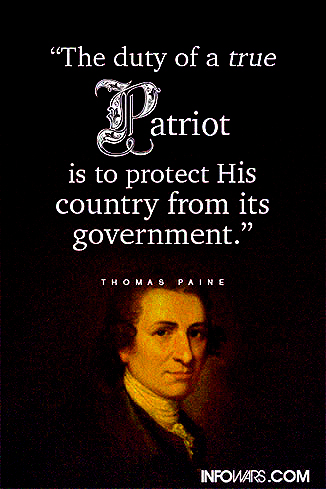
The BILL OF RIGHTS
As provided in the FIRST TEN AMENDMENTS TO THE CONSTITUTION OF THE
UNITED STATES Effective December 15, 1791
Preamble to the bill of rights of the Constitution of the United States of America
Conventions of a number of States, having at the time of their adopting the Constitution,
expressed a desire, in order to prevent misconstruction or abuse of its powers, that further
declaratory and restrictive clauses should be added: And as extending the ground of public
confidence in the Government, will but ensure the beneficent ends of its institution
RESOLVED...the following articles be ... part of the said Constitution;
NOTE: THIS PREAMBLE IS NOT OFFICIALLY A PART OF THE CONSTITUTION
ARTICLES IN ADDITION TO, AND AMENDMENT OF, THE CONSTITUTION OF THE
UNITED STATES OF AMERICA, PROPOSED BY CONGRESS, AND RATIFIED BY THE
LEGISLATURES OF THE SEVERAL STATES, PURSUANT TO THE FIFTH ARTICLE OF
THE ORIGINAL CONSTITUTION
AMENDMENT I (1791)
Congress shall make no law respecting an establishment of religion, or prohibiting the free
exercise thereof; or abridging the freedom of speech, or the press; or the right of the people
peaceably to assemble, and to petition the Government for a redress of grievances.
AMENDMENT II
(1791)
A well regulated militia, being necessary to the security of a free State,the right of the people to
keep and bear Arms, shall not be infringed.
AMENDMENT III
(1791)
No soldier shall, in time of peace be quartered in any house, without the consent of the Owner,
nor in time of war, but in a manner to be prescribed by law.
AMENDMENT IV
(1791)
The right of the people to be secure in their persons, houses, papers, and effects, against
unreasonable searches and seizures, shall not be violated, and no warrants shall issue, but upon
probable cause, supported by Oath or affirmation, and particularly describing the place to be
searched, and the persons or things to be seized.
AMENDMENT V
(1791)
No person shall be held to answer for a capital, or otherwise infamous crime, unless on a
presentment or indictment of a Grand Jury, except in cases arising in the land or naval forces, or
in the Militia, when in actual service in time of War or public danger; nor shall any person be
subject for the same offence to be twice put in jeopardy of life or limb; nor shall be compelled
in any criminal case to be a witness against himself, nor be deprived of life, liberty, or property,
without due process_ of law; nor shall private property be taken for public use, without just
compensation.
AMENDMENT VI
(1791)
In all criminal prosecutions, the accused shall enjoy the right to a speedy and public trial, by an
impartial jury of the State and district wherein the crime shall have been committed, which
district shall have been previously ascertained by law, and to be informed of the nature and
cause of the accusation; to be confronted with the witnesses against him; to have compulsory
process for obtaining witnesses in his favor, and to have the Assistance of Counsel for his
defense.
AMENDMENT VII
(1791)
In suits at common law, where the value in controversy shall exceed twenty dollars, the right of
trial by jury shall be preserved, and no fact tried by a jury, shall be otherwise reexamined in any
Court of the United States, than according to the rules of the common law.
AMENDMENT VIII
(1791)
Excessive bail shall not be required, nor excessive fines imposed, nor cruel and unusual
punishments inflicted.
AMENDMENT IX
(1791)
The enumeration in the Constitution, of certain rights, shall not be construed to deny or
disparage others retained by the people.
AMENDMENT X (1791)
The powers not delegated to the United States by the Constitution, nor prohibited by it to the
States, are reserved to the States respectively, or to the people.
AMENDMENT XI
(1795)
The judicial power of the United States shall not be construed to extend to any suit in law or
equity, commenced or prosecuted against one of the United States by Citizens of another State,
or by Citizens or Subjects of any Foreign State.
AMENDMENT XII
(1804)
The Electors shall meet in their respective states and vote by ballot for President and Vice-
President, one of whom, at least, shall not be an inhabitant of the same state with themselves;
they shall name in their ballots the person voted for as President, and in distinct ballots the
person voted for as Vice-President, and they shall make distinct lists of all persons voted for as
President, and of all persons voted for as Vice-President, and of the number of votes for each,
which lists they shall sign and certify, and transmit sealed to the seat of the government of the
United States, directed to the President of the Senate; - The President of the Senate shall, in
presence of the Senate and House of Representatives, open all the certificates and the votes
shall then be counted; - The person having the greatest number of votes for President, shall be
the President, if such number be a majority of the whole number of the Electors appointed; and
if no person have such a majority, then from the persons having the highest numbers not
exceeding three on the list of those voted for as President, the House of Representatives shall
choose immediately, by ballot, the President. But in choosing the President, the votes shall be
taken by states, the representation from each state having one vote; a quorum for this purpose
shall consist of a member or members from two-thirds of the states, and a majority of all the
states shall be necessary to a choice. [And if the House of Representatives shall not choose a
President whenever the right of choice shall devolve upon them, before the fourth day of March
next following, then the Vice-President shall act as President, as in the case of the death or
other constitutional disability of the President. -] The person having the greatest number of
votes as Vice-President, shall be the Vice-President, if such number be a majority of the whole
number of Electors appointed, and if no person have a majority, then from the two highest
numbers on the list, the Senate shall choose the Vice-President; a quorum for the purpose shall
consist of two-thirds of the whole number of Senators, and a majority of the whole number
shall be necessary to a choice. But no person constitutionally ineligible to the office of
President shall be eligible to that of Vice-President of the United States.
AMENDMENT XIII
(1865)
SECTION 1. Neither slavery nor involuntary servitude, except as a punishment for crime
whereof the party shall have been duly convicted, shall exist within the United States, or any
place subject to their jurisdiction.
SECTION 2. Congress shall have power to enforce this article by appropriate legislation.
AMENDMENT XIV
(1868)
SECTION 1. All persons born or naturalized in the United States, and subject to the jurisdiction
thereof, are citizens of the United States and the State wherein they reside. No State shall make
or enforce any law which shall abridge the privileges or immunities of citizens of the United
States; nor shall any State deprive any person of life, liberty, or property, without due process
of law; nor deny to any person within its jurisdiction the equal protection of the laws.
SECTION 2. Representatives shall be apportioned among the several States according to their
respective numbers, counting the whole number of persons in each State, excluding Indians not
taxed. But when the right to vote at any election for the choice of electors for President and
Vice-President of the United States, Representatives in Congress, the Executive and Judicial
officers of a State or the members of the Legislature thereof, is denied to any of the male
inhabitants of such State, being twenty-one years of age, and citizens of the United States, or in
any way abridged, except for participation in rebellion, or other crime, the basis of
representation therein shall be reduced in the proportion which the number of such male
citizens shall bear to the whole number of male citizens twenty-one years of age in such State.
SECTION 3. No person shall be a Senator or Representative in Congress, or elector of
President and Vice-President, or hold any office, civil or military, under the United States, or
under any State, who, having previously taken an oath, as a member of Congress, or as an
officer of the United States, or as a member of any State legislature, or as an executive
or Judicial officer of any State, to support the Constitution of the United States, shall have
engaged in insurrection or rebellion against the same, or given aid or comfort to the enemies
thereof. But Congress may by a vote of two-thirds of each House, remove such disability
SECTION 4. The validity of the public debt of the United States, authorized by law, including
debts incurred for payment of pensions and bounties for services in suppressing insurrection or
rebellion, shall not be questioned. But neither the United States nor any State shall assume or
pay any debt or obligation incurred in aid of insurrection or rebellion against the United States,
or any claim for the loss or emancipation of any slave; but all such debts, obligations and claims
shall be held illegal and void.
SECTION 5. The Congress shall have power to enforce, by appropriate legislation, the
provisions of this article.
AMENDMENT XV
(1870)
SECTION 1. The right of citizens of the United States to vote shall not be denied or abridged
by the United States or by any State on account of race, color, or previous condition of
servitude.
SECTION 2. The Congress shall have power to enforce this article by appropriate legislation.
AMENDMENT XVI
(1913)
The Congress shall have power to lay and collect taxes on income, from whatever source
derived, without apportionment among the several States, and without regard to any census or
enumeration.
AMENDMENT XVII
(1913)
The Senate of the United States shall be composed of two Senators from each State, elected by
the people thereof, for six years; and each Senator shall have one vote. The electors in each
state shall have the qualifications requisite for electors of the most numerous branch of the State
legislatures.
When vacancies happen in the representation of any State in the Senate, the executive authority
of such State shall issue writs of election to fill such vacancies: Provide, That the legislature of
any State may empower the executive thereof to make temporary appointments until the people
fill the vacancies by election as the legislature may direct.
This amendment shall not be so construed as to affect the election or term of any Senator
chosen before it becomes valid as part of the Constitution.
AMENDMENT XVIII
(1919)
SECTION 1. After one year from the ratification of this article the manufacture, sale, or
transportation of intoxicating liquors within, the importation thereof into, or the exportation
thereof from the United States and all territory subject to the jurisdiction thereof for beverage
purposes is hereby prohibited.
SECTION 2. The Congress and the several States shall have concurrent power to enforce this
article by appropriate legislation.
SECTION 3. This article shall be inoperative unless it shall have been ratified as an amendment
to the Constitution by the legislatures of the several States, as provided in the Constitution,
within seven years from the date of the submission hereof to the States by the Congress.
AMENDMENT XIX
(1920)
The right of citizens of the United States to vote shall not be denied or abridged by the United
States or by any State on account of sex.
Congress shall have power to enforce this article by appropriate legislation.
AMENDMENT XX
(1933)
SECTION 1. The terms of the President and Vice-President shall end at noon on the 20th day of
January, and the terms of senators and Representatives at noon on the 3rd day of January, of the
years in which such terms would have ended if this article had not been ratified; and the terms
of their successors shall then begin.
SECTION 2. The Congress shall assemble at least once in every year, and such meeting shall
begin at noon on the 3rd day of January, unless they shall by law appoint a different day.
SECTION 3. If, at the time fixed for the beginning of the term of the President, the President
elect shall have died, the Vice-President elect shall become President. If a President shall not
have been chosen before the time fixed for the beginning of his term, or if the President elect
shall have failed to qualify, then the Vice-President elect shall act as President until a President
shall have qualified; and the Congress may by law provide for the case wherein neither a
President elect nor a Vice-President elect shall have qualified, declaring who then shall then act
as President, or the manner in which one who is to act shall be selected, and such person shall
act accordingly until a President or Vice-President shall have qualified.
SECTION 4. The Congress may by law provide for the case of the death of any of the persons
from whom the House of Representatives may choose a President whenever the right of choice
shall have devolved upon them, and for the case of the death of any of the persons from whom
the Senate may choose a Vice-President whenever the right of choice shall have devolved upon
them.
SECTION 5. Sections 1 and 2 shall take effect on the 15th day of October following the
ratification of this article.
SECTION 6. This article shall be inoperative unless it shall have been ratified as an amendment
to the Constitution by the legislatures of three-fourths of the several States within seven years
from the date of its submission.
AMENDMENT XXI
(1933)
SECTION 1. The eighteenth article of amendment to the Constitution of the United States is
hereby repealed.
SECTION 2. The transportation or importation into any State, Territory, or possession of the
United States for delivery or use therein of intoxicating liquors, in violation of the laws thereof,
is hereby prohibited.
SECTION 3. This article shall be inoperative unless it shall have been ratified as an
amendment to the Constitution by conventions in the several States, as provided in the
Constitution, within seven years from the date of the submission hereof to the States by the
Congress.
AMENDMENT XXII
(1951)
SECTION 1. No person shall be elected to the office of the President more than twice, and no
person who has held the office of President, or acted as President, for more than two years of a
term to which some other person was elected President shall be elected to the office of
President more than once. But this article shall not apply to any person holding the office of
President when this article was proposed by the Congress, and shall not prevent any person who
may be holding the office of President, or acting as President, during the term within which this
Article becomes operative from holding the office of President or acting as President during the
remainder of such term.
SECTION 2. This article shall be inoperative unless it shall have been ratified as an amendment
to the Constitution by the legislatures of three-fourths of the several States within seven years
from the date of its submission to the States by the Congress.
AMENDMENT XXIII
(1961)
SECTION 1. The District constituting the seat of government of the United States shall
appoint in such manner as the Congress may direct:
A number of electors of President and Vice-President equal to the whole number of Senators
and Representatives in Congress to which the District would be entitled if it were a State, but in
no event more than the least populous State; they shall be in addition to those appointed by the
States, but they shall be considered, for the purposes of the election of President and VicePresident,
to be electors appointed by a State; and they shall meet in the District and perform
such duties as provided by the twelfth article of amendment.
SECTION 2. The Congress shall have power to enforce this amendment by appropriate
legislation.
AMENDMENT XXIV
(1964)
SECTION 1. The right of citizens of the United States to vote in any primary or other election
for President or Vice-President, or for Senator or Representative in Congress, shall not be
denied or abridged by the United States or any State by reason of failure to pay any poll tax or
other tax.
SECTION 2. The Congress shall have power to enforce this amendment by appropriate
legislation.
AMENDMENT XXV
(1967)
SECTION 1. In case of the removal of the President from office or of his death or resignation,
the Vice-President shall become President.
SECTION 2. Whenever there is a vacancy in the office of the Vice-President, the President
shall nominate a Vice-President who shall take office upon confirmation by a majority vote of
both Houses of Congress.
SECTION 3. Whenever the President transmits to the President pro tempore of the Senate and
the Speaker of the House of Representatives his written declaration that he is unable to
discharge the powers and duties of his office, and until he transmits to them a written
declaration to the contrary, such powers and duties shall be discharged by the Vice-President as
acting President.
SECTION 4. Whenever the Vice-President and a majority of either the principal officers of the
executive departments or of such other body as Congress may by law provide, transmit to the
President pro tempore of the Senate and the Speaker of the House of Representatives their
written declaration that the President is unable to discharge the powers and duties of his office,
the Vice-President shall immediately assume the powers and duties of the office as Acting
President.
Thereafter, when the President transmits to the President pro tempore of the senate and the
Speaker of the House of Representatives his written declaration that no inability exists, he shall
resume the powers and duties of his office unless the Vice-President and a majority of either the
principal officers of the executive department or of such other body as Congress may by law
provide, transmit within four days to the President pro tempore of the Senate and the Speaker of
the House of Representatives their written declaration that the President is unable to discharge
the powers and duties of his office. Thereupon, Congress shall decide the issue, assembling
within forty-eight hours for that purpose if not in session. If the Congress, within twenty-one
days after the receipt of the latter written declaration, or, if Congress is not in session, within
twenty-one days after Congress is required to assemble, determines by two-thirds vote of both
Houses that the President is unable to discharge the powers and duties of his office, the Vice-
President shall continue to discharge the same as Acting President; otherwise, the President
shall resume the powers and duties of his office.
AMENDMENT XXVI
(1971)
SECTION 1. The right of citizens of the United States, who are (18) eighteen years of age or
older, to vote shall not be denied or abridged by the United States or by any State on account of
age.
SECTION 2. The Congress shall have power to enforce this article by appropriate legislation.
“The poorest man may, in his cottage, bid defiance to all the forces of the Crown. It may be
frail, its roof may shake; the wind may blow through it; the storm may enter; the rain may enter;
but the King of England may not enter; all his force dares not cross the threshhold of the ruined
tenement.”
This neglected warning, was sounded by William Pitt before the British House of Commons
addressing the need for PRIVACY—the protection of LIFE, LIBERTY and HAPPINESS. Will
it go unheeded?
PROCLAIM LIBERTY!
Inscribed on our hallowed LIBERTY BELL are these words “PROCLAIM LIBERTY
THROUGHOUT ALL THE LAND UNTO ALL THE INHABITANTS THEREOF.”
• Lev. XXV X
“Government is not reason; it is not eloquence; it is force! Like fire, it is a dangerous servant
and a fearful master.”
• George Washington
“Woe to those who decree unjust statutes and to those who continually record unjust decisions,
to deprive the needy of justice, and to rob the poor of My people of their rights...”
• Isaiah 10:1,2
TAKING THE PLUNGE!
“My people are destroyed for lack of knowledge...!”
• Hosea 4:6
“The only thing necessary for evil to triumph is for good men to do nothing.”
• Edmund Burke 1729-1797
“If My people which are called by My name, shall humble themselves, and pray, and seek My
face, and turn from their wicked ways; then will I hear from Heaven, and will forgive their sin,
and will heal their land.”
• II Chron. 7:14
“We must obey GOD rather than men.”
• Acts 5:29
Dr. Benjamin Rush
"Education is favorable to Liberty. Freedom can only exist in a society of knowledge. Without learning, men are incapable of knowing their rights, and where learning is confined to a few people, Liberty can neither be equal nor universal."

REACH OUT TO OTHERS
[Help Educate Family And Friends With This Page And The Links Below]
RELATED LINKS:
The Constitution | Bill of Rights | Free Speech | Miranda Rights | Habeas Corpus
